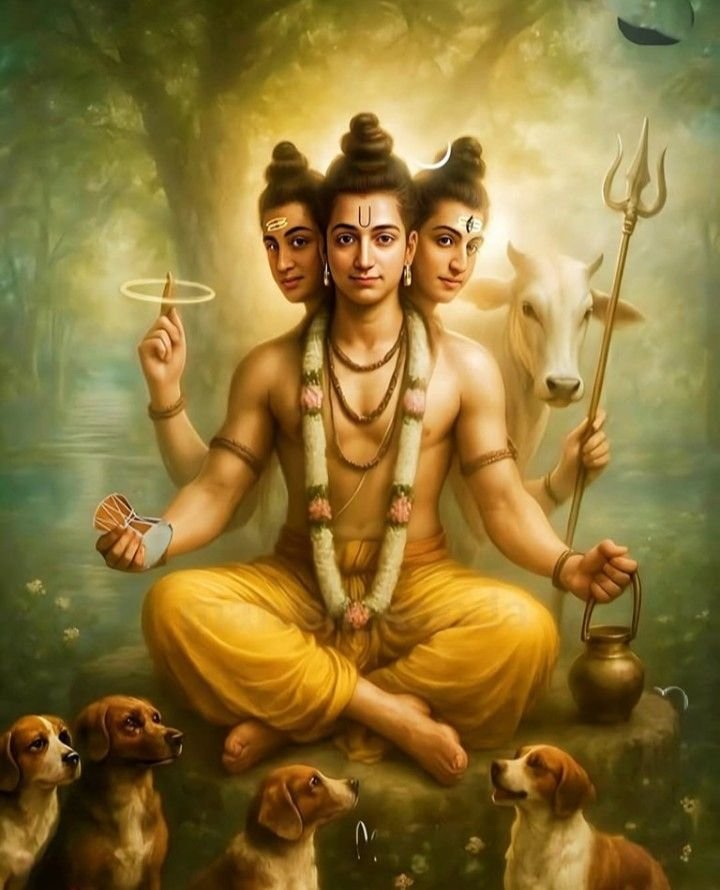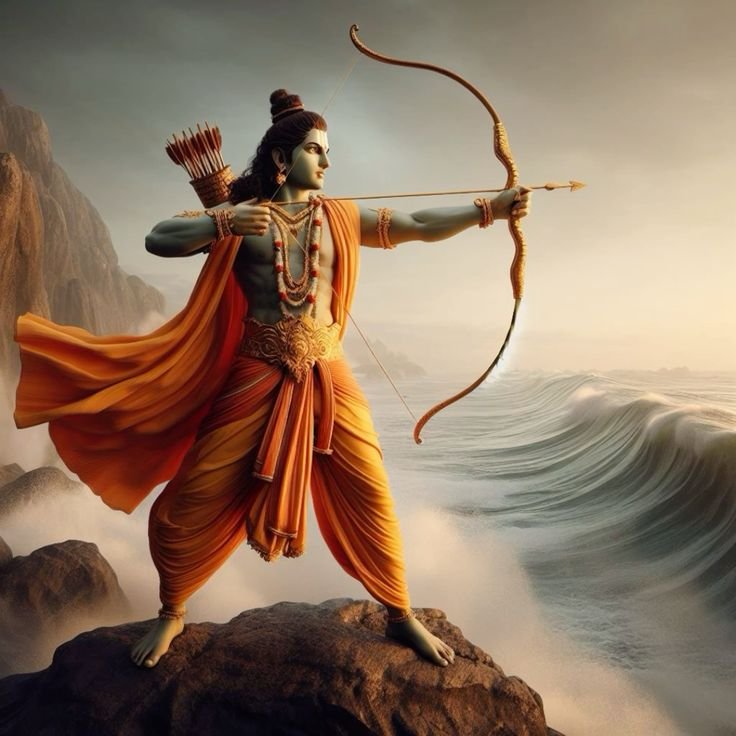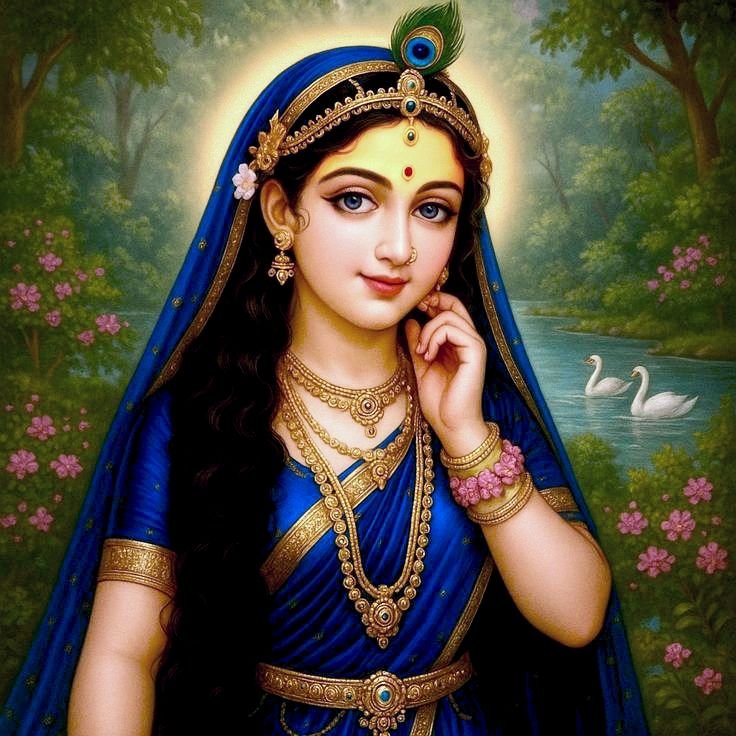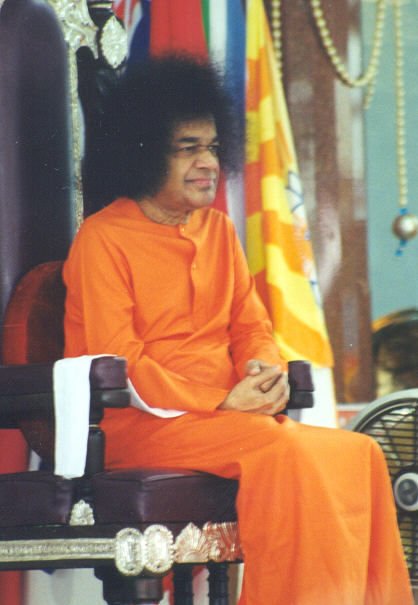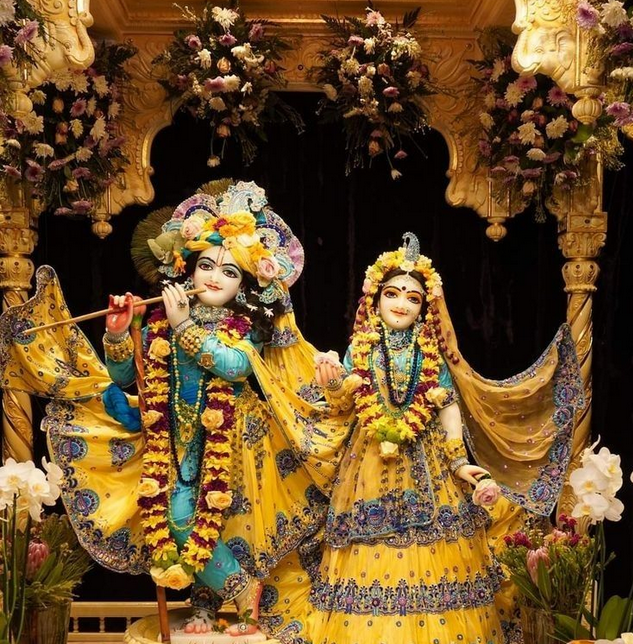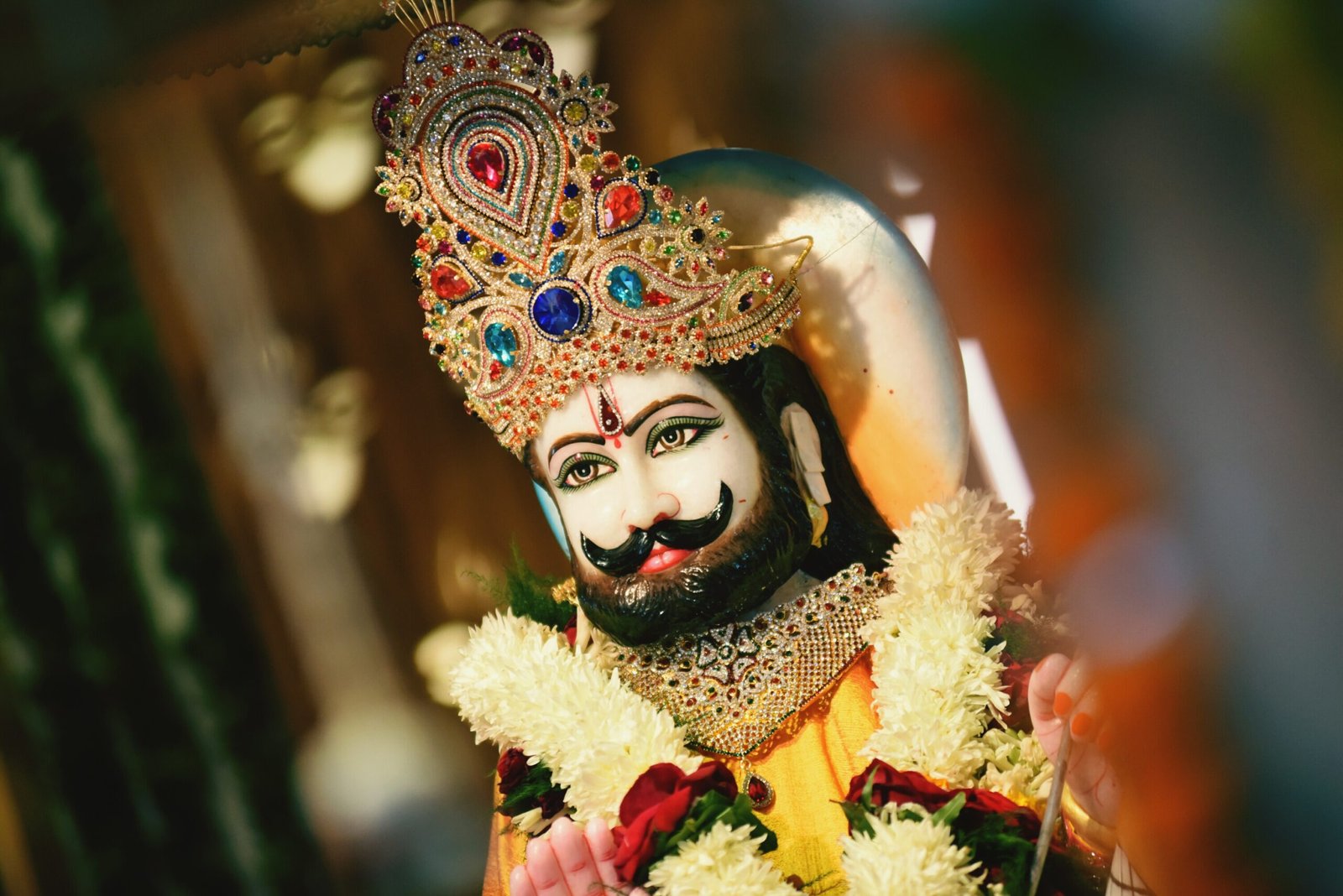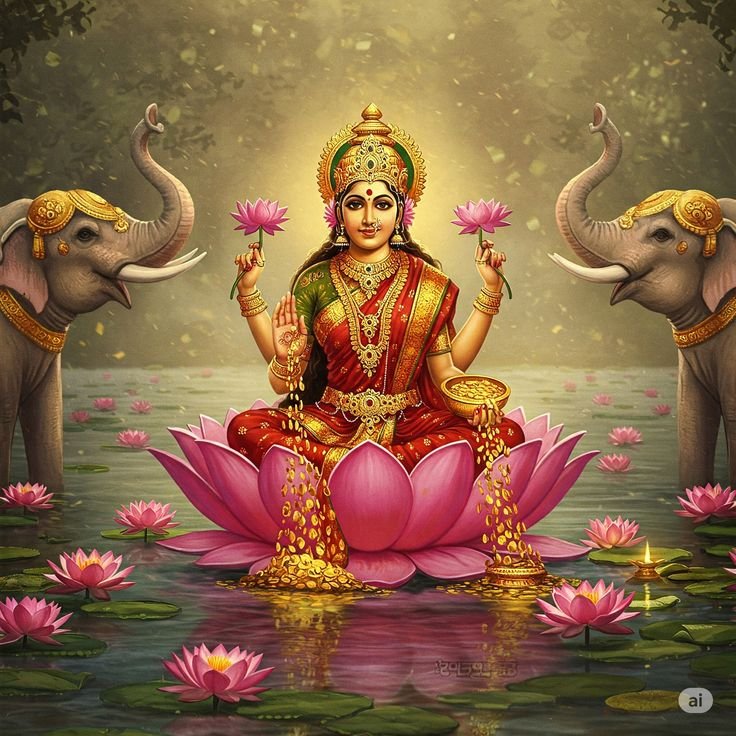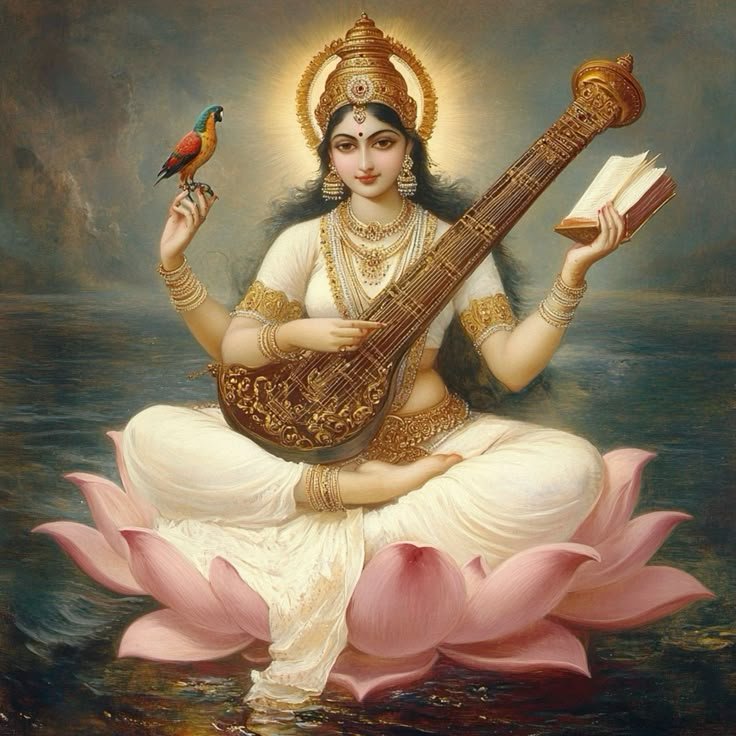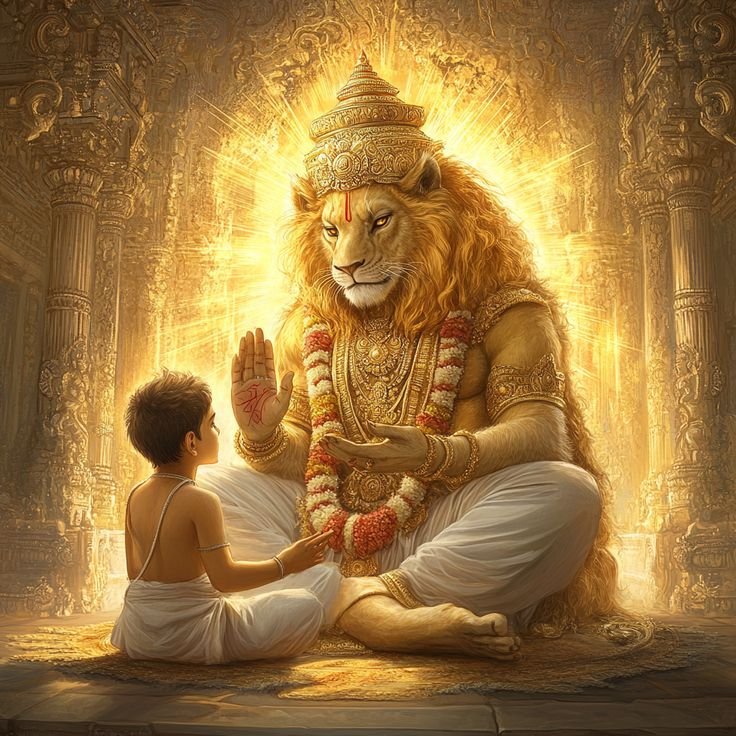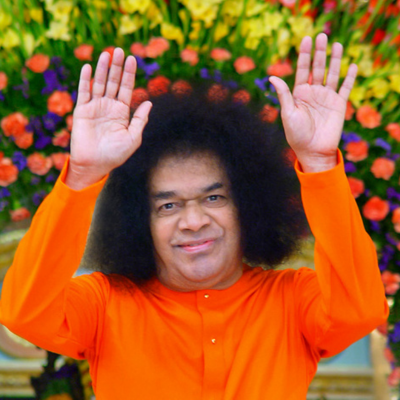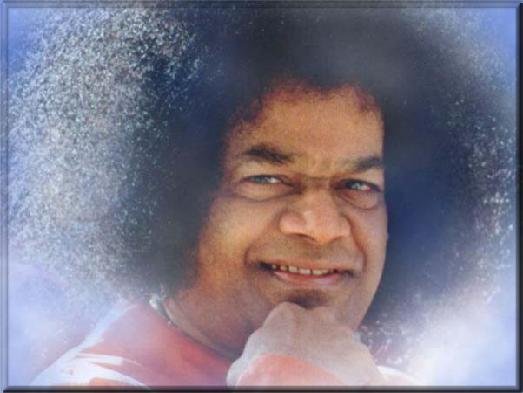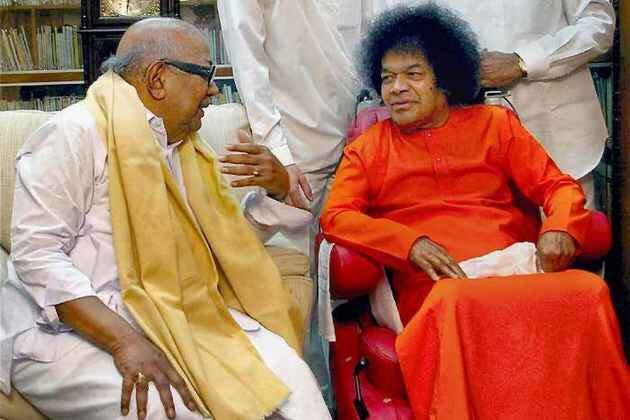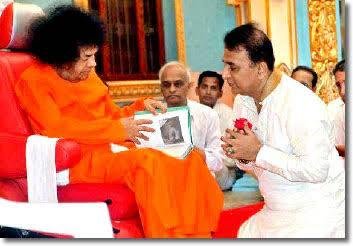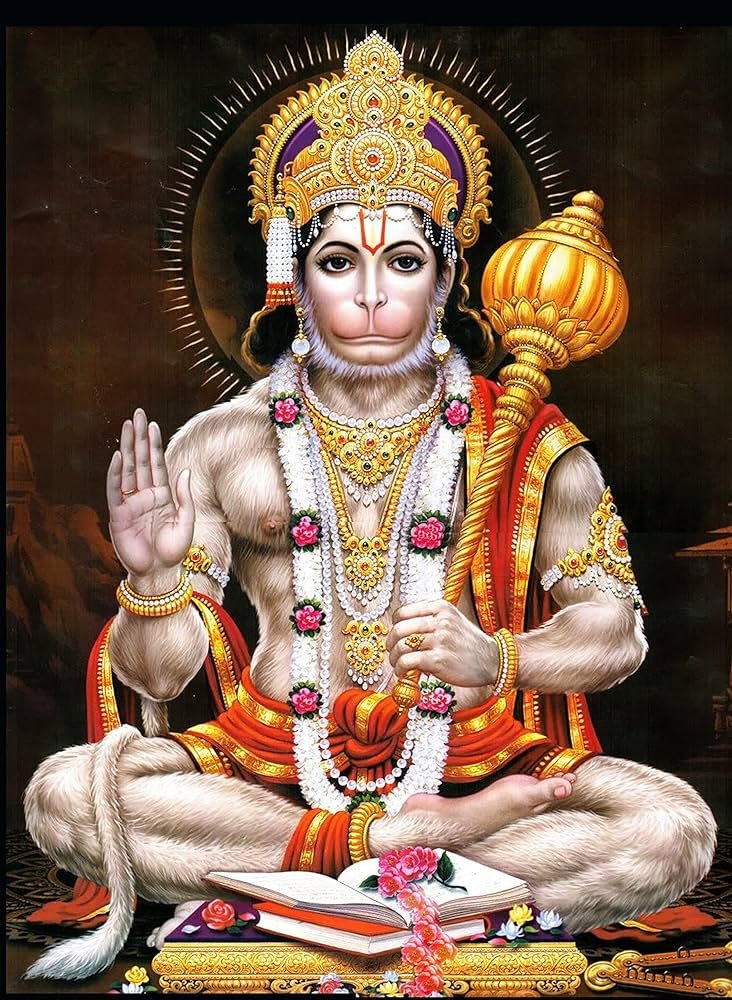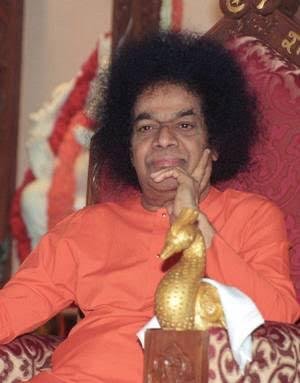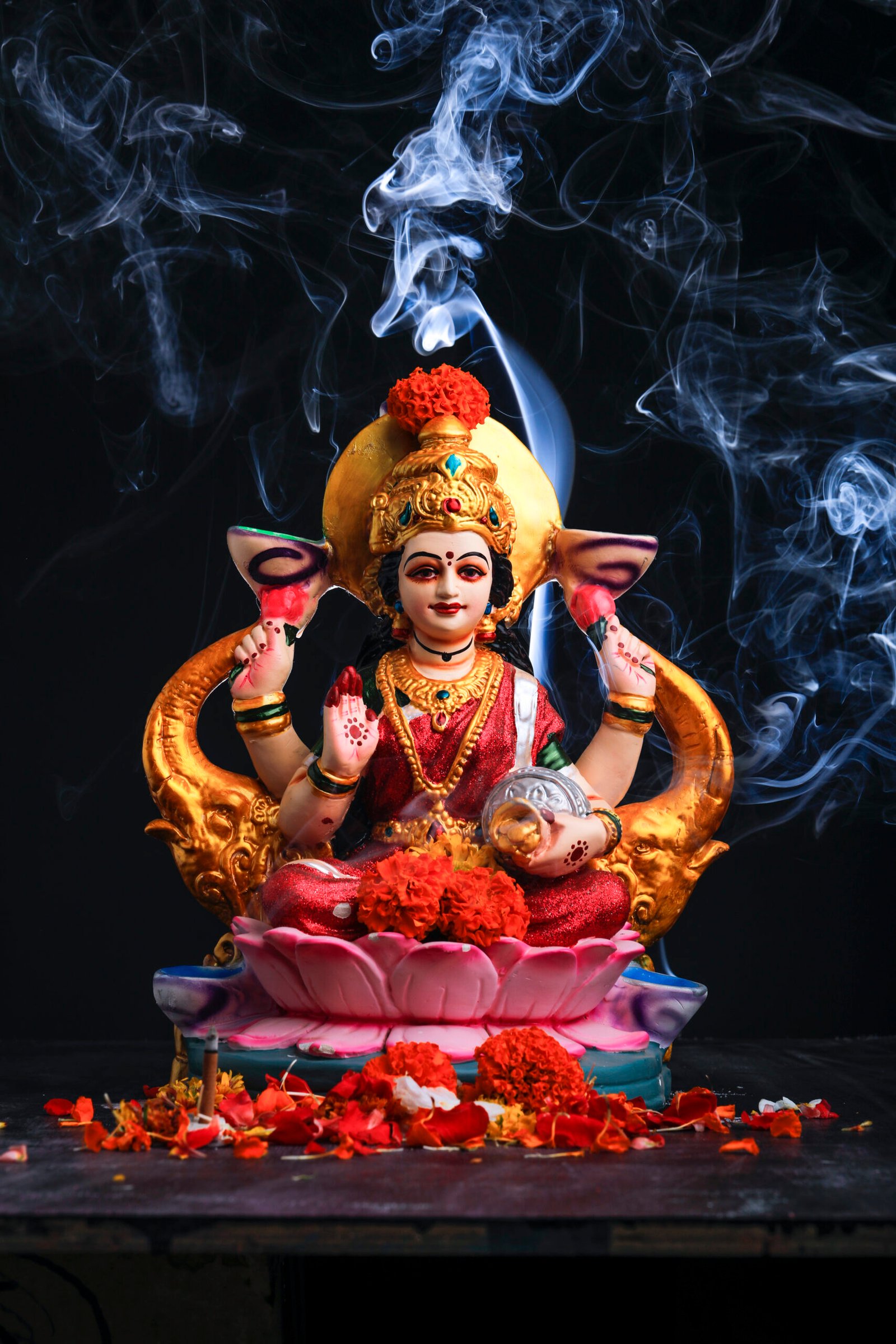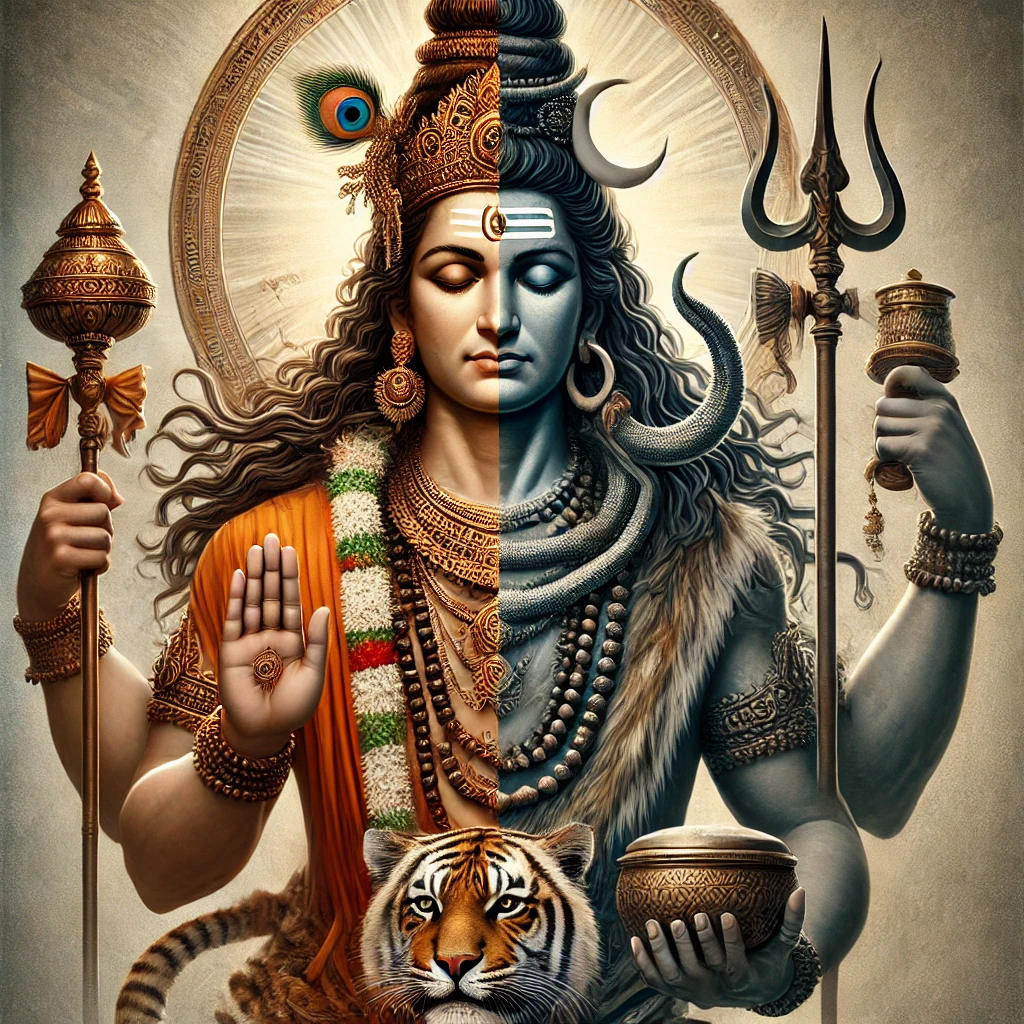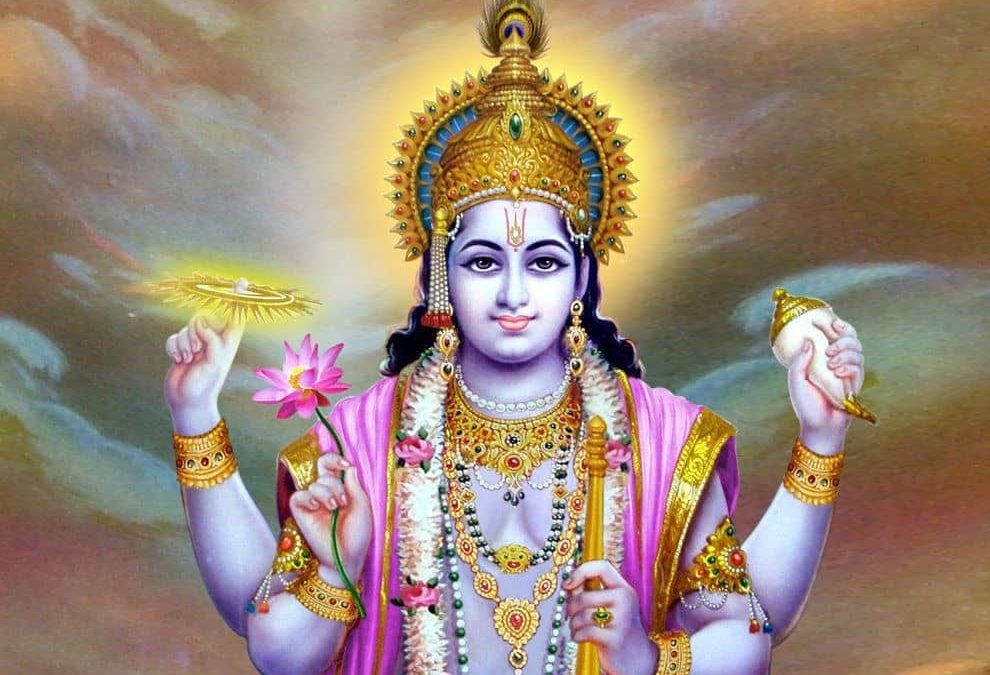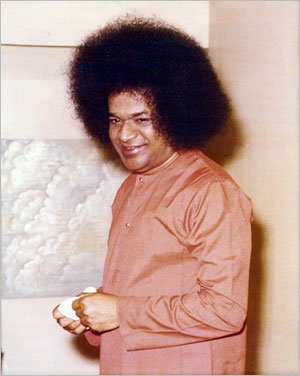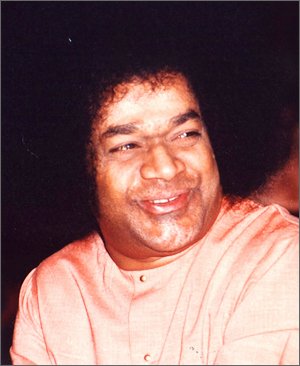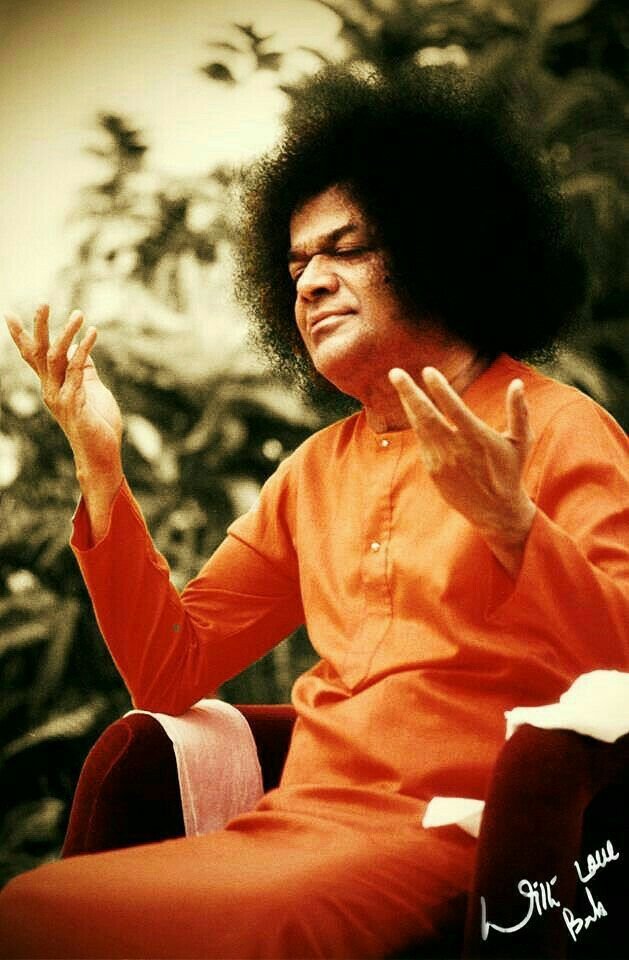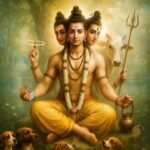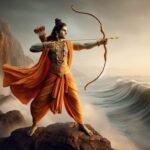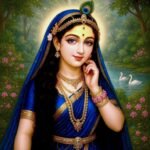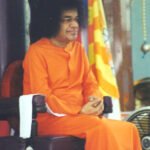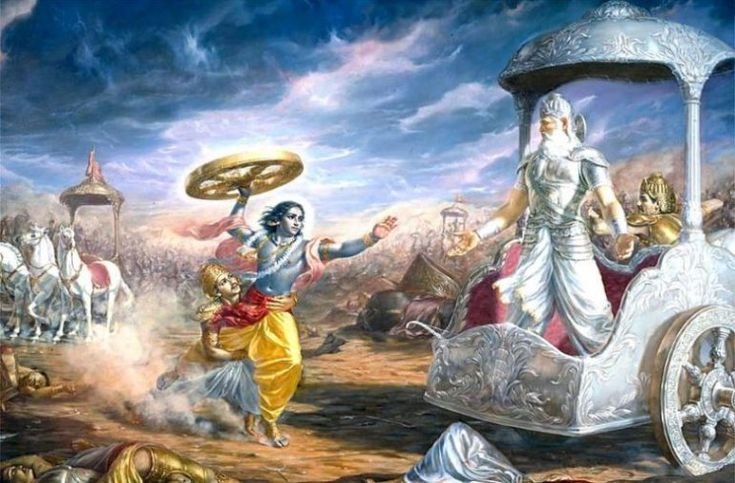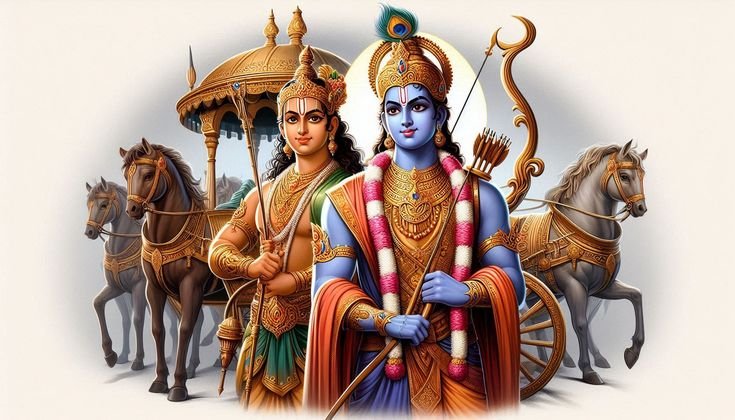Eleven
Chapter 11
Vishwaroopa Darshana Yoga
The eleventh chapter of the Bhagavad Gita is “Vishwaroopa Darshana Yoga”. In this chapter, Arjuna requests Krishna to reveal His Universal Cosmic Form that encompasses all the universes, the entire existence. Arjuna is granted divine vision to be able to see the entirety of creation in the body of the Supreme Lord Krishna.
Bhagavad Gita 11.1
अर्जुन उवाच मदनुग्रहाय परमं गुह्यमध्यात्मसंज्ञितम्। यत्त्वयोक्तं वचस्तेन मोहोऽयं विगतो मम।।11.1।।
arjuna uvācha mad-anugrahāya paramaṁ guhyam adhyātma-sanjñitam yat tvayoktaṁ vachas tena moho ’yaṁ vigato mama
arjunaḥ uvācha—Arjun said; mat-anugrahāya—out of compassion to me; paramam—supreme; guhyam—confidential; adhyātma-sanjñitam—about spiritual knowledge; yat—which; tvayā—by you; uktam—spoken; vachaḥ—words; tena—by that; mohaḥ—illusion; ayam—this; vigataḥ—is dispelled; mama—my
Translation
Arjuna said, By this explanation of the highest secret concerning the Self which Thou hast spoken, for the sake of blessing me, my delusion has been dispelled.
Commentary
Bhagavad Gita 11.2
भवाप्ययौ हि भूतानां श्रुतौ विस्तरशो मया। त्वत्तः कमलपत्राक्ष माहात्म्यमपि चाव्ययम्।।11.2।।
bhavāpyayau hi bhūtānāṁ śhrutau vistaraśho mayā tvattaḥ kamala-patrākṣha māhātmyam api chāvyayam
bhava—appearance; apyayau—disappearance; hi—indeed; bhūtānām—of all living beings; śhrutau—have heard; vistaraśhaḥ—in detail; mayā—by me; tvattaḥ—from you; kamala-patra-akṣha—lotus-eyed one; māhātmyam—greatness; api—also; cha—and; avyayam—eternal
Translation
The origin and destruction of beings have been heard in detail from You, O lotus-eyed Lord, and also Your inexhaustible greatness.
Commentary
11.2 भवाप्ययौ the origin and the dissolution? हि indeed? भूतानाम् of beings? श्रुतौ hav been heard? विस्तरशः in detail? मया by me? त्वत्तः from Thee? कमलपत्राक्ष O lotuseyed? माहात्म्यम् greatness? अपि also? च and? अव्ययम् inexhaustible.Commentary Kamalapatraksha Lotuseyed or having eyes like lotuspetals. Kamalapatra also means knowledge of the Self. He who can be obtained by knowledge of the Self is Kamalapatraksha.
Bhagavad Gita 11.3
एवमेतद्यथात्थ त्वमात्मानं परमेश्वर। द्रष्टुमिच्छामि ते रूपमैश्वरं पुरुषोत्तम।।11.3।।
evam etad yathāttha tvam ātmānaṁ parameśhvara draṣhṭum ichchhāmi te rūpam aiśhwaraṁ puruṣhottama
evam—thus; etat—this; yathā—as; āttha—have spoken; tvam—you; ātmānam—yourself; parama-īśhvara—Supreme Lord; draṣhṭum—to see; ichchhāmi—I desire; te—your; rūpam—form; aiśhwaram—divine; puruṣha-uttama—Shree Krishna, the Supreme Divine Personality
Translation
Now, O Supreme Lord, as Thou hast thus described Thyself, O Supreme Person, I wish to behold Thy divine form.
Commentary
11.3 एवम् thus? एतत् this? यथा as? आत्थ hast declared? त्वम् Thou? आत्मानम् Thyself? परमेश्वर O Supreme Lord? द्रष्टुम् to see? इच्छामि (I) desire? ते Thy? रूपम् form? ऐश्वरम् sovereign? पुरुषोत्तम O Supreme Purusha.Commentary Some commentators take the two halves of this verse as two independent sentences and interpret it thusSo it is? O Supreme Lord? as Thou hast declared Thyself to be. (But still) I desire to see Thy form as Isvara? O Supreme Person.Rupamaisvaram Thy form as Isvara? that of Vishnu as possessed of infinite knowledge? sovereignty? power? strength? prowess and splendour.
Bhagavad Gita 11.4
मन्यसे यदि तच्छक्यं मया द्रष्टुमिति प्रभो। योगेश्वर ततो मे त्वं दर्शयाऽत्मानमव्ययम्।।11.4।।
manyase yadi tach chhakyaṁ mayā draṣhṭum iti prabho yogeśhvara tato me tvaṁ darśhayātmānam avyayam
manyase—you think; yadi—if; tat—that; śhakyam—possible; mayā—by me; draṣhṭum—to behold; iti—thus; prabho—Lord; yoga-īśhvara—Lord of all mystic powers; tataḥ—then; me—to me; tvam—you; darśhaya—reveal; ātmānam—yourself; avyayam—imperishable
Translation
If Thou, O Lord, thinkest it possible for me to see it, do Thou, then, O Lord of the Yogis, show me Thy imperishable Self.
Commentary
11.4 मन्यसे Thou thinkest? यदि if? तत् that? शक्यम् possible? मया by me? द्रष्टुम् to see? इति thus? प्रभो O Lord? योगेश्वर O Lord of Yogins? ततः then? मे me? त्वम् Thou? दर्शय show? आत्मानम् (Thy) Self? अव्ययम् imperishable.Commentary Arjuna is very keen and eager to see the Cosmic Form of the Lord. He prays to Him to grant him the vision. This supreme vision can be obtained only through His grace.Yogesvara also means the Lord of Yoga. A Yogi is one who is endowed with the eight psychic powers (Siddhis). The Lord of the Yogins is Yogesvara. And? Yoga is identity of the individual soul with the Absolute. He who is able to bestow this realisation of identity on the deserving spiritual aspirant is Yogesvara.He Who is able to create? preserve? destroy? veil and graciously release is the Lord. (These five actions? Panchakriyas? are known respectively as Srishti? Sthiti? Samhara? Tirodhana and Anugraha.)
Bhagavad Gita 11.5
श्री भगवानुवाच पश्य मे पार्थ रूपाणि शतशोऽथ सहस्रशः। नानाविधानि दिव्यानि नानावर्णाकृतीनि च।।11.5।।
śhrī-bhagavān uvācha paśhya me pārtha rūpāṇi śhataśho ’tha sahasraśhaḥ nānā-vidhāni divyāni nānā-varṇākṛitīni cha
śhrī-bhagavān uvācha—the Supreme Lord said; paśhya—behold; me—my; pārtha—Arjun, the son of Pritha; rūpāṇi—forms; śhataśhaḥ—by the hundreds; atha—and; sahasraśhaḥ—thousands; nānā-vidhāni—various; divyāni—divine; nānā—various; varṇa—colors; ākṛitīni—shapes; cha—and
Translation
The Blessed Lord said, “Behold, O Arjuna, forms of Mine, by the hundreds and thousands, of different sorts, divine, and of various colors and shapes.”
Commentary
11.5 पश्य behold? मे My? पार्थ O Partha? रूपाणि forms? शतशः by hundreds? अथ and? सहस्रशः by thousands? नानाविधानि of different sorts? दिव्यानि divine? नानावर्णाकृतीनि of various colours and shapes? च and.Commentary Divyani Divine supernatural.Satasah? Sahasrasah By the hundreds and thousands — countless.O Arjuna? I want you to behold the Cosmic Form. All beings and entities are there. The fat and the lean? the short and the tall? the red and the black? the active and the passive? the rich and the poor? the intelligent and the dull? the healthy and the sick? the noisy and the silent? those that are awake? those that are asleep? the beautiful and the ugly? and all grades of beings with their distinctive marks are all there. The blueness of the sky? the yellowness of the silk? the redness of the twilight? the blackness of the coal? the whiteness of the snow? and the greenness of the leaves will be seen by you. You will also behold the objects of various shapes.
Bhagavad Gita 11.6
पश्यादित्यान्वसून्रुद्रानश्िवनौ मरुतस्तथा। बहून्यदृष्टपूर्वाणि पश्याऽश्चर्याणि भारत।।11.6।।
paśhyādityān vasūn rudrān aśhvinau marutas tathā bahūny adṛiṣhṭa-pūrvāṇi paśhyāśhcharyāṇi bhārata
paśhya—behold; ādityān—the (twelve) sons of Aditi; vasūn—the (eight) Vasus; rudrān—the (eleven) Rudras; aśhvinau—the (twin) Ashvini Kumars; marutaḥ—the (forty-nine) Maruts; tathā—and; bahūni—many; adṛiṣhṭa—never revealed; pūrvāṇi—before; paśhya—behold; āśhcharyāṇi—marvels; bhārata—Arjun, scion of the Bharatas
Translation
Behold the Adityas, the Vasus, the Rudras, the two Asvins, and the Maruts; behold many wonders never before seen, O Arjuna.
Commentary
11.6 पश्य behold? आदित्यान् the Adityas? वसून् the Vasus? रुद्रान् the Rudras? अश्िवनौ the (two) Asvins? मरुतः the Maruts? तथा also? बहूनि many? अदृष्टपूर्वाणि never seen before? पश्य see? आश्चर्याणि wonders? भारत O Bharata.Commentary Adityas? Vasus? Rudras and Maruts have already been described in the previous chapter.Not these alone Behold also many other wonders never seen before by you or anybody else in this world.
Bhagavad Gita 11.7
इहैकस्थं जगत्कृत्स्नं पश्याद्य सचराचरम्। मम देहे गुडाकेश यच्चान्यद्द्रष्टुमिच्छसि।।11.7।।
ihaika-sthaṁ jagat kṛitsnaṁ paśhyādya sa-charācharam mama dehe guḍākeśha yach chānyad draṣhṭum ichchhasi
iha—here; eka-stham—assembled together; jagat—the universe; kṛitsnam—entire; paśhya—behold; adya—now; sa—with; chara—the moving; acharam—the non- moving; mama—my; dehe—in this form; guḍākeśha—Arjun, the conqueror of sleep; yat—whatever; cha—also; anyat—else; draṣhṭum—to see; ichchhasi—you wish
Translation
Now, behold, O Arjuna, in this My body, the entire universe centered in one, including the moving and the unmoving, and whatever else you desire to see.
Commentary
11.7 इह in this? एकस्थम् centred in one? जगत् the universe? कृत्स्नम् whole? पश्य behold? अद्य now? सचराचरम् with the moving and the unmoving? मम My? देहे in body? गुडाकेश O Gudakesa? यत् whatever? च and? अन्यत् other? द्रष्टुम् to see? इच्छसि (thou) desirest.Commentary Anyat Other whatever else. Your success or defeat in the war? about which you,have entertained a doubt. (Cf.II.6)
Bhagavad Gita 11.8
न तु मां शक्यसे द्रष्टुमनेनैव स्वचक्षुषा। दिव्यं ददामि ते चक्षुः पश्य मे योगमैश्वरम्।।11.8।।
na tu māṁ śhakyase draṣhṭum anenaiva sva-chakṣhuṣhā divyaṁ dadāmi te chakṣhuḥ paśhya me yogam aiśhwaram
na—not; tu—but; mām—me; śhakyase—you can; draṣhṭum—to see; anena—with these; eva—even; sva-chakṣhuṣhā—with your physical eyes; divyam—divine; dadāmi—I give; te—to you; chakṣhuḥ—eyes; paśhya—behold; me—my; yogam aiśhwaram—majestic opulence
Translation
But you are not able to behold Me with these your own eyes; I give you the divine eye; behold My lordly Yoga.
Commentary
11.8 न not? तु but? माम् Me? शक्यसे (thou) canst? द्रष्टुम् to see? अनेन with this? एव even? स्वचक्षुषा with own eyes? दिव्यम् divine? ददामि (I) give? ते (to) thee? चक्षुः the eye? पश्य behold? मे My? योगम् Yoga? ऐश्वरम् lordly.Commentary No fleshly eyes can behold Me in My Cosmic Form. One can see It through the divine eye or the eye of intuition. It should not be confused with seeing through the eye or the mind. It is an inner experience.Lord Krishna says to Arjuna I give thee the divine eye? by which you will be able to behold My sovereign form. By it see My marvellous power of Yoga.Anena With this the fleshly eye or the physical eye? the earthly eye. (Cf.VII.25IX.5X.7)
Bhagavad Gita 11.9
सञ्जय उवाच एवमुक्त्वा ततो राजन्महायोगेश्वरो हरिः। दर्शयामास पार्थाय परमं रूपमैश्वरम्।।11.9।।
sañjaya uvācha evam uktvā tato rājan mahā-yogeśhvaro hariḥ darśhayām āsa pārthāya paramaṁ rūpam aiśhwaram
sañjayaḥ uvācha—Sanjay said; evam—thus; uktvā—having spoken; tataḥ—then; rājan—King; mahā-yoga-īśhvaraḥ—the Supreme Lord of Yog; hariḥ—Shree Krishna; darśhayām āsa—displayed; pārthāya—to Arjun; paramam—divine; rūpam aiśhwaram—opulence
Translation
Sanjaya said, Having thus spoken, O king, the great Lord of Yoga, Hari (Krishna), showed Arjuna His supreme form as the Lord.
Commentary
11.9 एवम् thus? उक्त्वा having spoken? ततः then? राजन् O king? महायोगेश्वरः the great Lord of Yoga? हरिः Hari? दर्शयामास showed? पार्थाय to Arjuna? परमम् Supreme? रूपम् form? ऐश्वरम् Sovereign.Commentary King This verse is addressed by Sanjaya to Dhritarashtra.Supreme Form The Cosmic Form.
Bhagavad Gita 11.10
अनेकवक्त्रनयनमनेकाद्भुतदर्शनम्। अनेकदिव्याभरणं दिव्यानेकोद्यतायुधम्।।11.10।।
aneka-vaktra-nayanam anekādbhuta-darśhanam aneka-divyābharaṇaṁ divyānekodyatāyudham
aneka—many; vaktra—faces; nayanam—eyes; aneka—many; adbhuta—wonderful; darśhanam—had a vision of; aneka—many; divya—divine; ābharaṇam—ornaments; divya—divine; aneka—many; udyata—uplifted; āyudham—weapons;
Translation
With numerous mouths and eyes, with numerous wondrous sights, with numerous divine adornments, with numerous divine weapons uplifted, such a form He showed.
Commentary
11.10 अनेकवक्त्रनयनम् with numerous mouthsand eyes? अनेकाद्भुतदर्शनम् with numerous wonderful sights? अनेकदिव्याभरणम् with numerous divine ornaments? दिव्यानेकोद्यतायुधम् with numerous divine weapons uplifted.Commentary Countless faces appeared there. Arjuna looked at this Cosmic Form in all its magnificence. He saw the Lord everywhere and in everything. The whole manifestation appeared as one gigantic body of the Lord. He saw the Lord as the allinall.
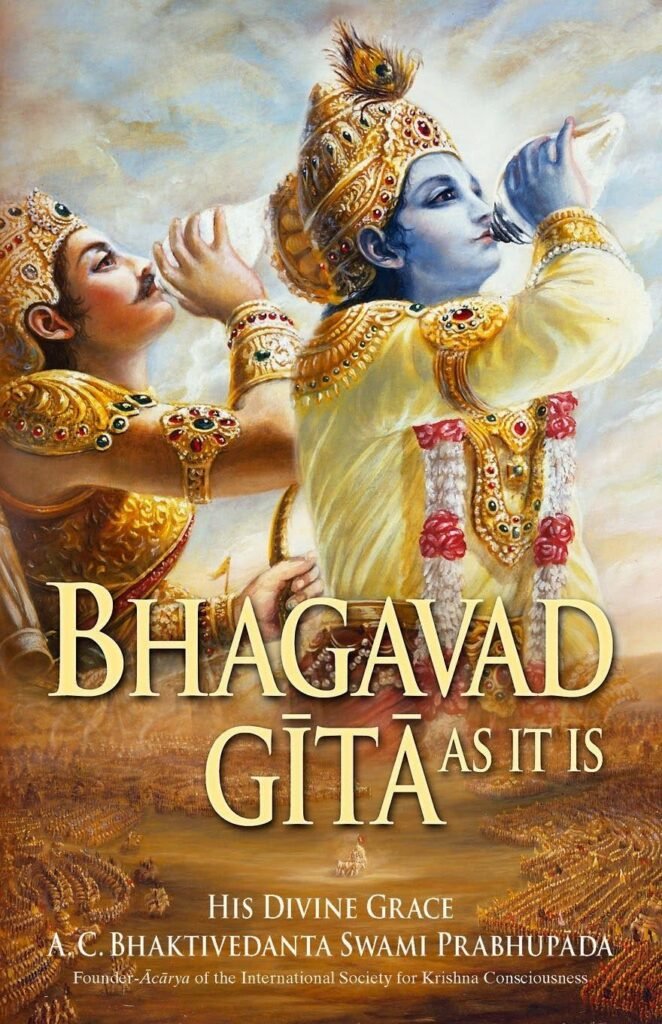
Bhagavad Gita 11.11
दिव्यमाल्याम्बरधरं दिव्यगन्धानुलेपनम्। सर्वाश्चर्यमयं देवमनन्तं विश्वतोमुखम्।।11.11।।
divya-mālyāmbara-dharaṁ divya-gandhānulepanam sarvāśhcharya-mayaṁ devam anantaṁ viśhvato-mukham
divya—divine; mālya—garlands; āmbara—garments; dharam—wearing; divya—divine; gandha—fragrances; anulepanam—anointed with; sarva—all; āśhcharya-mayam—wonderful; devam—Lord; anantam—unlimited; viśhwataḥ—all sides; mukham—face
Translation
Wearing divine garlands and apparel, anointed with divine unguents, the all-wonderful, resplendent Being is endless with faces on all sides.
Commentary
11.11 दिव्यमाल्याम्बरधरम् wearing divine garlands (necklaces) and apparel? दिव्यगन्धानुलेपनम् anointed with divine unguents? सर्वाश्चर्यमयम् the allwonderful? देवम् resplendent? अनन्तम् endless? विश्वतोमुखम् with faces on all sides.Commentary Visvatomukham With faces on all sides? as He is the Self of all beings.Devam God. Also means resplendent.Anantam Endless. He Who is free from the three kinds of limitations? viz.? DesaKalaVastuPariccheda (limitations of space? time? and thing respectively) is Anantam. He is Brahman. This philosophical concept is explained below.The pot is here. This is spacelimitatio. The pot is now here. This is timelimitation. The pot is not a cloth. This is thing(material) limitation. There is saffron in Kashmir only. This is limitation of space and thing. You can have apples only in September. This is limitation of time and thing. But Brahman is everywhere? as It is allpervading. It exists in the past? the present and the future. It dwells in all parts. Hence It is beyond these three limitations. It is therefore endless.
Bhagavad Gita 11.12
दिवि सूर्यसहस्रस्य भवेद्युगपदुत्थिता। यदि भाः सदृशी सा स्याद्भासस्तस्य महात्मनः।।11.12।।
divi sūrya-sahasrasya bhaved yugapad utthitā yadi bhāḥ sadṛiśhī sā syād bhāsas tasya mahātmanaḥ
divi—in the sky; sūrya—suns; sahasrasya—thousand; bhavet—were; yugapat—simultaneously; utthitā—rising; yadi—if; bhāḥ—splendor; sadṛiśhī—like; sā—that; syāt—would be; bhāsaḥ—splendor; tasya—of them; mahā-ātmanaḥ—the great personality
Translation
If the splendour of a thousand suns were to blaze out simultaneously in the sky, that would be the splendour of that mighty being.
Commentary
11.12 दिवि in the sky? सूर्यसहस्रस्य of a thousand suns? भवेत् were? युगपत् at once (simultaneously)? उत्थिता arisen? यदि if? भाः splendour? सदृशी like? सा that? स्यात् would be? भासः splendour? तस्य of that? महात्मनः of the mighty Being (great soul).Commentary Divi here means in the Antariksha or the sky.Mahatma here refers to the great Soul or the mighty Being? the Cosmic Form.
Bhagavad Gita 11.13
तत्रैकस्थं जगत्कृत्स्नं प्रविभक्तमनेकधा। अपश्यद्देवदेवस्य शरीरे पाण्डवस्तदा।।11.13।।
tatraika-sthaṁ jagat kṛitsnaṁ pravibhaktam anekadhā apaśhyad deva-devasya śharīre pāṇḍavas tadā
tatra—there; eka-stham—established in one place; jagat—the universe; kṛitsnam—entire; pravibhaktam—divided; anekadhā—many; apaśhyat—could see; deva-devasya—of the God of gods; śharīre—in the body; pāṇḍavaḥ—Arjun; tadā—at that time
Translation
There, in the body of the God of gods, Arjuna then saw the entire universe resting in one, with its myriad of divisions.
Commentary
11.13 तत्र there? एकस्थम् resting in one? जगत् the universe? कृत्स्नम् the whole? प्रविभक्तम् divided? अनेकधा in many groups? अपश्यत् saw? देवदेवस्य of the God of gods? शरीरे in the body? पाण्डवः son of Pandu? तदा then.Commentary Tatra There — in the Cosmic Form.Anekadha Many groups — gods? manes? men and other species of beings.Arjuna beheld all forms as the forms of the Lord? all heads as His heads? all eyes as His eyes? all hands as His hands? all feet as His feet? every part of every body as the limb of the Lords divine form. Wherever he looked he beheld nothing but the Lord. He got mystic divine knowledge.Sanjaya has given a truly graphic description of the Cosmic Form. Yet? it would be futile to grasp it with the finite mind. It is a transcendental vision? beyond the reach of the mind and senses. It has to be realised in Samadhi.
Bhagavad Gita 11.14
ततः स विस्मयाविष्टो हृष्टरोमा धनञ्जयः। प्रणम्य शिरसा देवं कृताञ्जलिरभाषत।।11.14।।
tataḥ sa vismayāviṣhṭo hṛiṣhṭa-romā dhanañjayaḥ praṇamya śhirasā devaṁ kṛitāñjalir abhāṣhata
tataḥ—then; saḥ—he; vismaya-āviṣhṭaḥ—full of wonder; hṛiṣhṭa-romā—with hair standing on end; dhanañjayaḥ—Arjun, the conqueror of wealth; praṇamya—bow down; śhirasā—with (his) head; devam—the Lord; kṛita-añjaliḥ—with folded hands; abhāṣhata—he addressed
Translation
Then, Arjuna, filled with wonder and his hair standing on end, bowed his head to the God and spoke with palms joined.
Commentary
11.14 ततः then? सः he? विस्मयाविष्टः filled with wonder? हृष्टरोमा with hair standing on end? धनञ्जयः Arjuna? प्रणम्य having prostrated? शिरसा with (his) head? देवम् the God? कृताञ्जलिः with joined palms? अभाषत spoke.Commentary Tatah Then? having seen the Cosmic Form.Arjuna joined his palms in order to do prostration to the Cosmic Form. The great hero had attained true humility which the bowed head and joined palms represented? and which is the essential ingredient of devotion.
Bhagavad Gita 11.15
अर्जुन उवाच पश्यामि देवांस्तव देव देहे सर्वांस्तथा भूतविशेषसङ्घान्। ब्रह्माणमीशं कमलासनस्थ मृषींश्च सर्वानुरगांश्च दिव्यान्।।11.15।।
arjuna uvācha paśhyāmi devāns tava deva dehe sarvāns tathā bhūta-viśheṣha-saṅghān brahmāṇam īśhaṁ kamalāsana-stham ṛiṣhīnśh cha sarvān uragānśh cha divyān
arjunaḥ uvācha—Arjun said; paśhyāmi—I behold; devān—all the gods; tava—your; deva—Lord; dehe—within the body; sarvān—all; tathā—as well as; bhūta viśheṣha-saṅghān—hosts of different beings; brahmāṇam—Lord Brahma; īśham—Shiv; kamala-āsana-stham—seated on the lotus flower; ṛiṣhīn—sages; cha—and; sarvān—all; uragān—serpents; cha—and; divyān—divine
Translation
Arjuna said, “O God, I see all the gods in Your body, as well as hosts of various classes of beings, Brahma the Lord seated on the lotus, all the sages, and the celestial serpents.”
Commentary
11.15 पश्यामि (I) see? देवान् the gods? तव Thy? देव O God? देहे in the body? सर्वान् all? तथा also? भूतविशेषसङ्घान् hosts of various classes of beings? ब्रह्माणम् Brahma? ईशम् the Lord? कमलासनस्थम् seated on the lotus? ऋषीन् sages? च and? सर्वान् all? उरगान् serpents? च and? दिव्यान् divine.Commentary Arjuna describes his own experience of the Cosmic Form in this and the following verses? 15 to 31.Bhutaviseshasanghan Hosts of various classes of beings? both animate and inanimate. These numerous entities are in Thy Cosmic Form? like hairs on the human body.Brahma? the fourfaced? the Lord of all creatures? is seated in the centre of the earthlotus on the Meru which forms the thalamus as it were of the earthlotus.Sages? such as Vasishtha. Serpents? such as Vasuki.Moreover —
Bhagavad Gita 11.16
अनेकबाहूदरवक्त्रनेत्रं पश्यामि त्वां सर्वतोऽनन्तरूपम्। नान्तं न मध्यं न पुनस्तवादिं पश्यामि विश्वेश्वर विश्वरूप।।11.16।।
aneka-bāhūdara-vaktra-netraṁ paśhyāmi tvāṁ sarvato ’nanta-rūpam nāntaṁ na madhyaṁ na punas tavādiṁ paśhyāmi viśhveśhvara viśhva-rūpa
aneka—infinite; bāhu—arms; udara—stomachs; vaktra—faces; netram—eyes; paśhyāmi—I see; tvām—you; sarvataḥ—in every direction; ananta-rūpam—inifinite forms; na antam—without end; na—not; madhyam—middle; na—no; punaḥ—again; tava—your; ādim—beginning; paśhyāmi—I see; viśhwa-īśhwara—The Lord of the universe; viśhwa-rūpa—universal form
Translation
I see You with boundless form on every side, with many arms, stomachs, mouths, and eyes; neither the end nor the middle nor the beginning do I see, O Lord of the Universe, O Cosmic Form.
Commentary
11.16 अनेकबाहूदरवक्त्रनेत्रम् with manifold arms? stomachs? mouths and eyes? पश्यामि (I) see? त्वाम् Thee? सर्वतः on every side? अनन्तरूपम् of boundless form? न not? अनत्म् end? न not? मध्यम् middle? न not? पुनः,again? तव Thy? आदिम् origin? पश्यामि (I) see? विश्वेश्वर O Lord of the universe? विश्वरूप O Cosmic Form.Commentary A thing that is limited by space and time has a begining? a middle and an end? but the Lord is omnipresent and eternal. He exists in the three periods of time — past? present and future? but is not limited by time and space. Therefore He has neither a beginning nor middle nor end.Arjuna could have this divine vision only with the help of the divine eye bestowed upon him by the Lord. He who has supreme devotion to the Lord and on whom the Lord showers His grace can enjoy this wondrous vision.
Bhagavad Gita 11.17
किरीटिनं गदिनं चक्रिणं च तेजोराशिं सर्वतोदीप्तिमन्तम्। पश्यामि त्वां दुर्निरीक्ष्यं समन्ता द्दीप्तानलार्कद्युतिमप्रमेयम्।।11.17।।
kirīṭinaṁ gadinaṁ chakriṇaṁ cha tejo-rāśhiṁ sarvato dīptimantam paśhyāmi tvāṁ durnirīkṣhyaṁ samantād dīptānalārka-dyutim aprameyam
kirīṭinam—adorned with a crown; gadinam—with club; chakriṇam—with discs; cha—and; tejaḥ-rāśhim—abode of splendor; sarvataḥ—everywhere; dīpti-mantam—shining; paśhyāmi—I see; tvām—you; durnirīkṣhyam—difficult to look upon; samantāt—in all directions; dīpta-anala—blazing fire; arka—like the sun; dyutim—effulgence; aprameyam—immeasurable
Translation
I see You with the diadem, club, and discus, a mass of radiance shining everywhere, very hard to look at, blazing all around like a burning fire and the sun, and immeasurable.
Commentary
11.17 किरीटिनम् one with diadem? गदिनम् with club? चक्रिणम् with discus? च and? तेजोराशिम् a mass of radiance? सर्वतः everywhere? दीप्तिमन्तम् shining? पश्यामि (I) see? त्वाम् Thee? दुर्निरीक्ष्यम् very hard to look at? समन्तात् all round? दीप्तानलार्कद्युतिम् blazing like burning fire and sun? अप्रमेयम् immeasurable.Commentary Kiritam is a special ornament for the head? the crown.Arjuna had worshipped the Lord as having a crown? club and discus and the Lord showed him the same form now. He is in all forms and He is beyond all forms as the transcendental Reality. Who can comprehend His GloryTejorasim A mass of splendour that cannot be perceived without the inner divine eye of intuition.Aprameyam Immeasurable? whose limits cannot be fixed.I infer from this vision of Thy power of Yoga that Thu art the Imperishable? etc.
Bhagavad Gita 11.18
त्वमक्षरं परमं वेदितव्यं त्वमस्य विश्वस्य परं निधानम्। त्वमव्ययः शाश्वतधर्मगोप्ता सनातनस्त्वं पुरुषो मतो मे।।11.18।।
tvam akṣharaṁ paramaṁ veditavyaṁ tvam asya viśhvasya paraṁ nidhānam tvam avyayaḥ śhāśhvata-dharma-goptā sanātanas tvaṁ puruṣho mato me
tvam—you; akṣharam—the imperishable; paramam—the supreme being; veditavyam—worthy of being known; tvam—you; asya—of this; viśhwasya—of the creation; param—supreme; nidhānam—support; tvam—you; avyayaḥ—eternal; śhāśhvata-dharma-goptā—protector of the eternal religion; sanātanaḥ—everlasting; tvam—you; puruṣhaḥ—the Supreme Divine Person; mataḥ me—my opinion
Translation
You are the Imperishable, the Supreme Being, worthy of being known. You are the great treasure-house of this universe; You are the imperishable protector of the eternal Dharma; You are the Primal Person, I believe.
Commentary
11.18 त्वम् Thou? अक्षरम् imperishable? परमम् the Supreme Being? वेदितव्यम् worthy to be known? त्वम् Thou? अस्य (of) this? विश्वस्य of universe? परम् the great? निधानम् treasurehouse? त्वम् Thou? अव्ययः imperishable? शाश्वतधर्मगोप्ता Protector of the Eternal Dharma? सनातनः ancient? त्वम् Thou? पुरुषः Purusha? मतः thought? मे of me.Commentary VisvasyaNidhaanam Treasurehouse of this universe? also means abode or refuge or the substratum of this universe. It is because of this that all the beings in the universe are preserved and protected. He is the inexhaustibel source to Whom the devotee turns at all times. Deluded indeed are they that ignore this divine treasurehouse and runa fter the shadow of the objects of the senses which do not contain even an iota of pleasure.Veditavyam To be known by the aspirants or seekrs of liberation? through Sravana (hearing of the scriptures)? Manana (reflection) and Nididhyasana (meditation).Avyayah means inexhaustible? unchanging? undying.
Bhagavad Gita 11.19
अनादिमध्यान्तमनन्तवीर्य मनन्तबाहुं शशिसूर्यनेत्रम्। पश्यामि त्वां दीप्तहुताशवक्त्रम् स्वतेजसा विश्वमिदं तपन्तम्।।11.19।।
anādi-madhyāntam ananta-vīryam ananta-bāhuṁ śhaśhi-sūrya-netram paśhyāmi tvāṁ dīpta-hutāśha-vaktraṁ sva-tejasā viśhvam idaṁ tapantam
Translation
I see You without beginning, middle, or end, infinite in power, with endless arms, the sun and moon as Your eyes, the burning fire Your mouth, heating the entire universe with Your radiance.
Commentary
11.19 अनादिमध्यान्तम् without beginning? middle or end? अनन्तवीर्यम् infinite in power? अनन्तबाहुम् of endless arms? शशिसूर्यनेत्रम् Thy eyes as the sun and the moon? पश्यामि (I) see? त्वाम् Thee? दीप्तहुताशवक्त्रम् Thy mouth as the burning fire? स्वतेजसा with Thy radiance? विश्वम् the universe? इदम् this? तपन्तम् heating.Commentary Anantabahu Having endless arms. This denotes that the multiplicity of His limbs are endless.
Bhagavad Gita 11.20
द्यावापृथिव्योरिदमन्तरं हि व्याप्तं त्वयैकेन दिशश्च सर्वाः। दृष्ट्वाऽद्भुतं रूपमुग्रं तवेदं लोकत्रयं प्रव्यथितं महात्मन्।।11.20।।
dyāv ā-pṛithivyor idam antaraṁ hi vyāptaṁ tvayaikena diśhaśh cha sarvāḥ dṛiṣhṭvādbhutaṁ rūpam ugraṁ tavedaṁ loka-trayaṁ pravyathitaṁ mahātman
dyau-ā-pṛithivyoḥ—between heaven and earth; idam—this; antaram—space between; hi—indeed; vyāptam—pervaded; tvayā—by you; ekena—alone; diśhaḥ—directions; cha—and; sarvāḥ—all; dṛiṣhṭvā—seeing; adbhutam—wondrous; rūpam—form; ugram—terrible; tava—your; idam—this; loka—worlds; trayam—three; pravyathitam—trembling; mahā-ātman—The greatest of all beings
Translation
This space between the earth and the heavens, and all the quarters, is filled by You alone; having seen this, Your wonderful and terrible form, the three worlds are trembling with fear, O great-souled Being.
Commentary
11.20 द्यावापृथिव्योः of heaven and earth? इदम् this? अन्तरम् interspace? हि indeed? व्याप्तम् is filled? त्वया by Thee? एकेन alone? दिशः arters? च and? सर्वाः all? दृष्ट्वा having seen? अद्भुतम् wonderful? रूपम् form? उग्रम् terrible? तव Thy? इदम् this? लोकत्रयम् the three worlds? प्रव्यथितम् are trembling with fear? महात्मन् O greatsouled Being.Commentary Thee In Thy Cosmic Form.The space and the arters This denotes that the Lord has filled the whole universe of animate and inanimate objects.In order to remove the doubt entertained by Arjuna as to his success (Cf.II.6) Lord Krishna makes him feel now that victoyr for the Pandavas is certain.
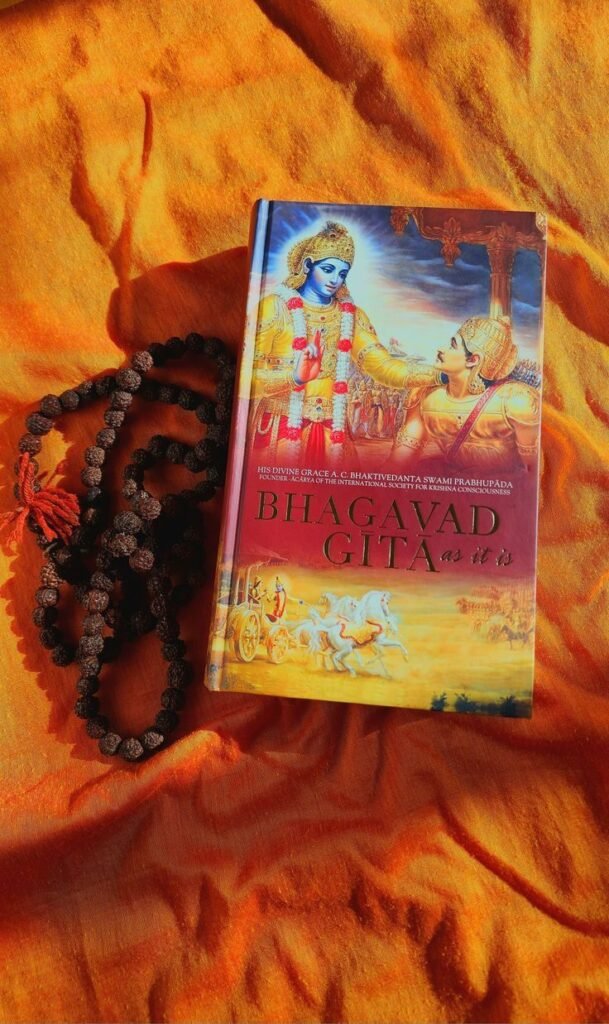
Bhagavad Gita 11.21
अमी हि त्वां सुरसङ्घाः विशन्ति केचिद्भीताः प्राञ्जलयो गृणन्ति। स्वस्तीत्युक्त्वा महर्षिसिद्धसङ्घाः स्तुवन्ति त्वां स्तुतिभिः पुष्कलाभिः।।11.21।।
amī hi tvāṁ sura-saṅghā viśhanti kechid bhītāḥ prāñjalayo gṛiṇanti svastīty uktvā maharṣhi-siddha-saṅghāḥ stuvanti tvāṁ stutibhiḥ puṣhkalābhiḥ
amī—these; hi—indeed; tvām—you; sura-saṅghāḥ—assembly of celestial gods; viśhanti—are entering; kechit—some; bhītāḥ—in fear; prāñjalayaḥ—with folded hands; gṛiṇanti—praise; svasti—auspicious; iti—thus; uktvā—reciting; mahā-ṛiṣhi—great sages; siddha-saṅghāḥ—perfect beings; stuvanti—are extolling; tvām—you; stutibhiḥ—with prayers; puṣhkalābhiḥ—hymns
Translation
Verily, these hosts of gods enter into Thee; some extol Thee with joined palms in fear, saying, ‘May it be well!’ Bands of great sages and perfected ones praise Thee with complete hymns.
Commentary
11.21 अमी these? हि verily? त्वाम् Thee? सुरसङ्घाः hosts of gods? विशन्ति enter? केचित् some? भीताः in fear? प्राञ्जलयः with joined palms? गृणन्ति extol? स्वस्ति may it be well? इति thus? उक्त्वा having said? महर्षिसिद्धसङ्घाः bands of great Rishis and Siddhas? स्तुवन्ति paise? त्वाम् Thee? स्तुतिभिः with hymns? पुष्कलाभिः complete.Commentary Pushkalabhih means complete or wellworded praises or praises full of deep meanings.Great sages like Narada and perfected ones like Kapila praise Thee with inspiring hymns.
Bhagavad Gita 11.22
रुद्रादित्या वसवो ये च साध्या विश्वेऽश्िवनौ मरुतश्चोष्मपाश्च। गन्धर्वयक्षासुरसिद्धसङ्घा वीक्षन्ते त्वां विस्मिताश्चैव सर्वे।।11.22।।
rudrādityā vasavo ye cha sādhyā viśhve ’śhvinau marutaśh choṣhmapāśh cha gandharva-yakṣhāsura-siddha-saṅghā vīkṣhante tvāṁ vismitāśh chaiva sarve
rudra—a form of Lord Shiv; ādityāḥ—the Adityas; vasavaḥ—the Vasus; ye—these; cha—and; sādhyāḥ—the Sadhyas; viśhve—the Vishvadevas; aśhvinau—the Ashvini kumars; marutaḥ—the Maruts; cha—and; uṣhma-pāḥ—the ancestors; cha—and; gandharva—Gandharvas; yakṣha—the Yakshas; asura—the demons; siddha—the perfected beings; saṅghāḥ—the assemblies; vīkṣhante—are beholding; tvām—you; vismitāḥ—in wonder; cha—and; eva—verily; sarve—all
Translation
The Rudras, Adityas, Vasus, Sadhyas, Visvedevas, the two Asvins, Maruts, the Manus, and the hosts of celestial singers, Yakshas, demons, and the perfected ones, all look upon Thee with great amazement.
Commentary
11.22 रुद्रादित्याः Rudras and Adityas? वसवः Vasus? ये these? च and? साध्याः Sadhyas? विश्वे Visvedevas? अश्िवनौ the two Asvins? मरुतः Maruts? च and? उष्मपाः Pitris? च and? गन्धर्वयक्षासुरसिद्धसङ्घाः hosts of Gandharvas? Yakshas? Asuras and Siddhas? वीक्षन्ते are looking at? त्वाम् Thee? विस्मिताः astonished? च and? एव even? सर्वे all.Commentary Sadhyas are a class of gods of whom Brahma is the chief.Visvedevas are ten gods who in Vedic times were considered as protectors of human beings. They were called guardians of the world. They were givers of plenty to the human beings. Their names are Krata? Daksha? Vasu? Satya? Kama? Kala? Dhvani? Rochaka? Adrava and Pururava.The two Asvins? born of Prabha (light)? daughter of Tushta and the Sun? are the physicians of the gods.Rudras? Adityas? Vasus and Maruts — see tenth chapter? verses 21 and 23.Ushmapa A class of manes. They accept the food offered in the Sraaddha (anniversary) ceremony or the obseies? while it is hot. Hence they are called Ushmapas. There are seven groups of manes.Gandharvas are celestial singers such as Haha and Huhu.Yakshas such as Kubera (the god of wealth) Asuras such as Virochana perfected ones such as Kapila.
Bhagavad Gita 11.23
रूपं महत्ते बहुवक्त्रनेत्रं महाबाहो बहुबाहूरुपादम्। बहूदरं बहुदंष्ट्राकरालं दृष्ट्वा लोकाः प्रव्यथितास्तथाऽहम्।।11.23।।
rūpaṁ mahat te bahu-vaktra-netraṁ mahā-bāho bahu-bāhūru-pādam bahūdaraṁ bahu-danṣhṭrā-karālaṁ dṛiṣhṭvā lokāḥ pravyathitās tathāham
rūpam—form; mahat—magnificent; te—your; bahu—many; vaktra—mouths; netram—eyes; mahā-bāho—mighty-armed Lord; bahu—many; bāhu—arms; ūru—thighs; pādam—legs; bahu-udaram—many stomachs; bahu-danṣhṭrā—many teeth; karālam—terrifying; dṛiṣhṭvā—seeing; lokāḥ—all the worlds; pravyathitāḥ—terror-stricken; tathā—so also; aham—I
Translation
Having seen Your immeasurable form with many mouths and eyes, O mighty-armed one, with many arms, thighs, and feet, with many stomachs and fearsome with many teeth, the worlds are terrified, and so am I.
Commentary
11.23 रूपम् form? महत् immeasurable? ते Thy? बहुवक्त्रनेत्रम् with many mouths and eyes? महाबाहो O,mightyarmed? बहुबाहूरुपादम् with many arms? thighs and feet? बहूदरम् with many stomachs. बहुदंष्ट्राकरालम् fearful with many teeth? दृष्ट्वा having seen? लोकाः the worlds? प्रव्यथिताः are terrified? तथा also? अहम् I.Commentary Lokah The worlds — all living beings in the world. Here is the cause of my fear. Arjuna describes below the nature of the Cosmic Form which has caused terror in his heart.
Bhagavad Gita 11.24
नभःस्पृशं दीप्तमनेकवर्णं व्यात्ताननं दीप्तविशालनेत्रम्। दृष्ट्वा हि त्वां प्रव्यथितान्तरात्मा धृतिं न विन्दामि शमं च विष्णो।।11.24।।
nabhaḥ-spṛiśhaṁ dīptam aneka-varṇaṁ vyāttānanaṁ dīpta-viśhāla-netram dṛiṣhṭvā hi tvāṁ pravyathitāntar-ātmā dhṛitiṁ na vindāmi śhamaṁ cha viṣhṇo
nabhaḥ-spṛiśham—touching the sky; dīptam—effulgent; aneka—many; varṇam—colors; vyātta—open; ānanam—mouths; dīpta—blazing; viśhāla—enormous; netram—eyes; dṛiṣhṭvā—seeing; hi—indeed; tvām—you; pravyathitāntar-ātmā—my heart is trembling with fear; dhṛitim—firmness; na—not; vindāmi—I find; śhamam—mental peace; cha—and; viṣhṇo—Lord Vishnu
Translation
On seeing Thee, touching the sky, shining in many colors, with mouths wide open, with large fiery eyes, I am terrified at heart and find neither courage nor peace, O Vishnu.
Commentary
11.24 नभःस्पृशम् touching the sky? दीप्तम् shining? अनेकवर्णम् in many colours? व्यात्ताननम् with mouths wide open? दीप्तविशालनेत्रम् with larve fiery eyes? दृष्ट्वा having seen? हि verily? त्वाम् Thee? प्रव्यथितान्तरात्मा terrified at heart? धृतिम् courage? न not? विन्दामि (I) find? शमम् peace? च and? विष्णो O Vishnu.Commentary Dhriti also means patience and strength. Sama also means control.The vision of the Cosmic Form has frightened Arjuna considerably.
Bhagavad Gita 11.25
दंष्ट्राकरालानि च ते मुखानि दृष्ट्वैव कालानलसन्निभानि। दिशो न जाने न लभे च शर्म प्रसीद देवेश जगन्निवास।।11.25।।
danṣhṭrā-karālāni cha te mukhāni dṛiṣhṭvaiva kālānala-sannibhāni diśho na jāne na labhe cha śharma prasīda deveśha jagan-nivāsa
danṣhṭrā—teeth; karālāni—terrible; cha—and; te—your; mukhāni—mouths; dṛiṣhṭvā—having seen; eva—indeed; kāla-anala—the fire of annihilation; sannibhāni—resembling; diśhaḥ—the directions; na—not; jāne—know; na—not; labhe—I obtain; cha—and; śharma—peace; prasīda—have mercy; deva-īśha—The Lord of lords; jagat-nivāsa—The shelter of the universe
Translation
Having seen Thy mouths fearful with teeth blazing like the fires of cosmic dissolution, I know not the four quarters, nor do I find peace. Have mercy, O Lord of the gods, O abode of the universe.
Commentary
11.25 दंष्ट्राकरालानि fearful with teeth? च and? ते Thy? मुखानि mouths? दृष्ट्वा having seen? एव even? कालानलसन्निभानि blazing like Pralayafires? दिशः the four arters? न not? जाने know? न not? लभे do (I) obtain? च and? शर्म peace? प्रसीद have mercy? देवेश O Lord of the gods? जगन्निवास O abode of the universe.Commentary Jagannivasa The substratum of the universe.Kalanala The fires which consume the worlds during the final dissolution of the worlds (Pralaya). Time (Kala) is the consumer of all that is manifest.Diso no jane I do not know the four arters. I cannot distinguish the east from the west? nor the north from the south.
Bhagavad Gita 11.26
अमी च त्वां धृतराष्ट्रस्य पुत्राः सर्वे सहैवावनिपालसङ्घैः। भीष्मो द्रोणः सूतपुत्रस्तथाऽसौ सहास्मदीयैरपि योधमुख्यैः।।11.26।।
amī cha tvāṁ dhṛitarāśhtrasya putrāḥ sarve sahaivāvani-pāla-saṅghaiḥ bhīṣhmo droṇaḥ sūta-putras tathāsau sahāsmadīyair api yodha-mukhyaiḥ vaktrāṇi te tvaramāṇā viśhanti danṣhṭrā-karālāni bhayānakāni kechid vilagnā daśhanāntareṣhu sandṛiśhyante chūrṇitair uttamāṅgaiḥ
amī—these; cha—and; tvām—you; dhṛitarāśhtrasya—of Dhritarashtra; putrāḥ—sons; sarve—all; saha—with; eva—even; avani-pāla—their allied kings; sanghaiḥ—assembly; bhīṣhmaḥ—Bheeshma; droṇaḥ—Dronacharya; sūta-putraḥ—Karna; tathā—and also; asau—this; saha—with; asmadīyaiḥ—from our side; api—also; yodha-mukhyaiḥ—generals; vaktrāṇi—mouths; te—your; tvaramāṇāḥ—rushing; viśhanti—enter; danṣhṭrā—teeth; karālāni—terrible; bhayānakāni—fearsome; kechit—some; vilagnāḥ—getting stuck; daśhana-antareṣhu—between the teeth; sandṛiśhyante—are seen; chūrṇitaiḥ—getting smashed; uttama-aṅgaiḥ—heads
Translation
All the sons of Dhritarashtra, along with the hosts of kings of the earth, Bhishma, Drona, and Karna, as well as the chief among our warriors.
Commentary
11.26 अमी these? च and? त्वाम् Thee? धृतराष्ट्रस्य of Dhritarashtra? पुत्राः sons? सर्वे all? सह with? एव even? अवनिपालसङ्घैः hosts of kings? भीष्मः Bhishma? द्रोणः Drona? सूतपुत्रः Karana? तथा also? असौ this? सह with? अस्मदीयैः with (those) of ours? अपि also? योधमुख्यैः (with) warrior chiefs.Commentary Karna? though he was the son of Kunti? the mother of the Pandavas? was brought up by a charioteer and hence came to be regarded as his son.
Bhagavad Gita 11.27
वक्त्राणि ते त्वरमाणा विशन्ति दंष्ट्राकरालानि भयानकानि। केचिद्विलग्ना दशनान्तरेषु संदृश्यन्ते चूर्णितैरुत्तमाङ्गैः।।11.27।।
vaktrāṇi te tvaramāṇā viśanti daṁṣṭrā-karālāni bhayānakāni kecid vilagnā daśanāntareṣu sandṛśyante cūrṇitair uttamāṅgaiḥ
vaktrāṇi—mouths; te—Your; tvaramāṇāḥ—fearful; viśanti—entering; daṁṣṭrā—teeth; karālāni—terrible; bhayānakāni—very fearful; kecit—some of them; vilagnāḥ—being attacked; daśanāntareṣu—between the teeth; sandṛśyante—being seen; cūrṇitaiḥ—smashed; uttama-aṅgaiḥ—by the head
Translation
Some hurry into Your mouths with their terrible teeth, fearful to behold. Some are found stuck in the gaps between the teeth, their heads crushed to powder.
Commentary
11.27 वक्त्राणि mouths? ते Thy? त्वरमाणाः hurrying? विशन्ति enter? दंष्ट्राकरालानि terribletoothed? भयानकानि fearful to behold? केचित् some? विलग्नाः sticking? दशनान्तरेषु in the gaps between the teeth? संदृश्यन्ते are found? चूर्णितैः crushed to powder? उत्तमाङ्गैः with (their) heads.Commentary How do they enter into the mouth Arjuna continues
Bhagavad Gita 11.28
यथा नदीनां बहवोऽम्बुवेगाः समुद्रमेवाभिमुखाः द्रवन्ति। तथा तवामी नरलोकवीरा विशन्ति वक्त्राण्यभिविज्वलन्ति।।11.28।।
yathā nadīnāṁ bahavo ’mbu-vegāḥ samudram evābhimukhā dravanti tathā tavāmī nara-loka-vīrā viśhanti vaktrāṇy abhivijvalanti
yathā—as; nadīnām—of the rivers; bahavaḥ—many; ambu-vegāḥ—water waves; samudram—the ocean; eva—indeed; abhimukhāḥ—toward; dravanti—flowing rapidly; tathā—similarly; tava—your; amī—these; nara-loka-vīrāḥ—kings of human society; viśhanti—enter; vaktrāṇi—mouths; abhivijvalanti—blazing;
Translation
Verily, just as many torrents of rivers flow towards the ocean, so too these heroes in the world of men enter Thy flaming mouths.
Commentary
11.28 यथा as? नदीनाम् of rivers? बहवः many? अम्बुवेगाः watercurrents? समुद्रम् to the ocean? एव verily? अभिमुखाः towards? द्रवन्ति flow? तथा so? तव Thy? अमी these? नरलोकवीराः heroes in the world of men? विशन्ति enter? वक्त्राणि mouths? अभिविज्वलन्ति flaming.Commentary Ami These warriors such as Bhishma. Arjuna is now seeing all these warriors,whom he did not wish to kill? rushing to death. His delusion has vanished. He thinks now This battle cannot be avoided. It has the sanction of the Supreme Lord. Why should I worry about the inevitable The Lord has already destroyed these warriors. I am only an instrument in His hands. No sin can touch me even if I kill them. This is a just cause also.Why and how do they enter Arjuna says —
BG 11.29
यथा प्रदीप्तं ज्वलनं पतङ्गा विशन्ति नाशाय समृद्धवेगाः। तथैव नाशाय विशन्ति लोका स्तवापि वक्त्राणि समृद्धवेगाः।।11.29।।
yathā pradīptaṁ jvalanaṁ pataṅgā viśhanti nāśhāya samṛiddha-vegāḥ tathaiva nāśhāya viśhanti lokās tavāpi vaktrāṇi samṛiddha-vegāḥ
yathā—as; pradīptam—blazing; jvalanam—fire; pataṅgāḥ—moths; viśhanti—enter; nāśhāya—to be perished; samṛiddha vegāḥ—with great speed; tathā eva—similarly; nāśhāya—to be perished; viśhanti—enter; lokāḥ—these people; tava—your; api—also; vaktrāṇi—mouths; samṛiddha-vegāḥ—with great speed
Translation
As moths hurriedly rush into a blazing fire, leading to their own destruction, so too these creatures hurry into Your mouths, leading to their own destruction.
Commentary
11.29 यथा as? प्रदीप्तम् blazing? ज्वलनम् fire? पतङ्गाः moths? विशन्ति enter? नाशाय to destruction? समृद्धवेगाः with ickened speed? तथा so? एव only? नाशाय to destruction? विशन्ति enter? लोकाः creatures? तव Thy? अपि also? वक्त्राणि mouths? समृद्धवेगाः with ickened speed.No Commentary.
Bhagavad Gita 11.30
लेलिह्यसे ग्रसमानः समन्ता ल्लोकान्समग्रान्वदनैर्ज्वलद्भिः। तेजोभिरापूर्य जगत्समग्रं भासस्तवोग्राः प्रतपन्ति विष्णो।।11.30।।
lelihyase grasamānaḥ samantāl lokān samagrān vadanair jvaladbhiḥ tejobhir āpūrya jagat samagraṁ bhāsas tavogrāḥ pratapanti viṣhṇo
lelihyase—you are licking; grasamānaḥ—devouring; samantāt—on all sides; lokān—worlds; samagrān—all; vadanaiḥ—with mouths; jvaladbhiḥ—blazing; tejobhiḥ—by effulgence; āpūrya—filled with; jagat—the universe; samagram—all; bhāsaḥ—rays; tava—your; ugrāḥ—fierce; pratapanti—scorching; viṣhṇo—Lord Vishnu
Translation
Thou lickest up, devouring all the worlds on every side with Thy flaming mouths. Thy fierce rays, filling the whole world with radiance, burn, O Vishnu!
Commentary
11.30 लेलिह्यसे (Thou) lickest? ग्रसमानः devouring? समन्तात् on every side? लोकान् the worlds? समग्रान् all? वदनैः with mouths? ज्वलद्भिः flaming? तेजोभिः with radiance? आपूर्य filling? जगत् the world? समग्रम् the whole? भासः rays? तव Thy? उग्राः fierce? प्रतपन्ति are burning? विष्णो O VishnuCommentary Vishnu means allpervading? Vyapanasila.
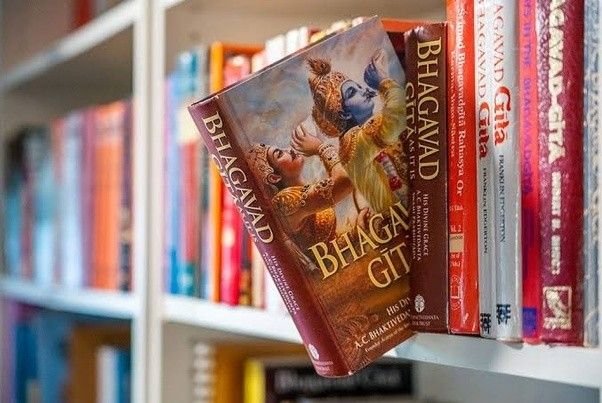
Bhagavad Gita 11.31
आख्याहि मे को भवानुग्ररूपो नमोऽस्तु ते देववर प्रसीद। विज्ञातुमिच्छामि भवन्तमाद्यं न हि प्रजानामि तव प्रवृत्तिम्।।11.31।।
ākhyāhi me ko bhavān ugra-rūpo namo ’stu te deva-vara prasīda vijñātum ichchhāmi bhavantam ādyaṁ na hi prajānāmi tava pravṛittim
ākhyāhi—tell; me—me; kaḥ—who; bhavān—you; ugra-rūpaḥ—fierce form; namaḥ astu—I bow; te—to you; deva-vara—God of gods; prasīda—be merciful; vijñātum—to know; ichchhāmi—I wish; bhavantam—you; ādyam—the primeval; na—not; hi—because; prajānāmi—comprehend; tava—your; pravṛittim—workings
Translation
Tell me, who you are, so fierce of form. I offer my salutations to you, O God Supreme; have mercy on me. I desire to know you, the original Being. I do not indeed know your workings.
Commentary
11.31 आख्याहि tell? मे me? कः who (art)? भवान् Thou? उग्ररूपः fierce in form? नमः salutation? अस्तु be? ते to Thee? देववर O God Supreme? प्रसीद have mercy? विज्ञातुम् to know? इच्छामि (I) wish? भवन्तम् Thee? आद्यम् the original Being? न not? हि indeed? प्रजानामि (I) know? तव Thy? प्रवृत्तिम् doing.No Commentary.
Bhagavad Gita 11.32
श्री भगवानुवाच कालोऽस्मि लोकक्षयकृत्प्रवृद्धो लोकान्समाहर्तुमिह प्रवृत्तः। ऋतेऽपि त्वां न भविष्यन्ति सर्वे येऽवस्थिताः प्रत्यनीकेषु योधाः।।11.32।।
śhrī-bhagavān uvācha kālo ’smi loka-kṣhaya-kṛit pravṛiddho lokān samāhartum iha pravṛittaḥ ṛite ’pi tvāṁ na bhaviṣhyanti sarve ye ’vasthitāḥ pratyanīkeṣhu yodhāḥ
śhrī-bhagavān uvācha—the Supreme Lord said; kālaḥ—time; asmi—I am; loka-kṣhaya-kṛit—the source of destruction of the worlds; pravṛiddhaḥ—mighty; lokān—the worlds; samāhartum—annihilation; iha—this world; pravṛittaḥ—participation; ṛite—without; api—even; tvām—you; na bhaviṣhyanti—shall cease to exist; sarve—all; ye—who; avasthitāḥ—arrayed; prati-anīkeṣhu—in the opposing army; yodhāḥ—the warriors
Translation
The Blessed Lord said, “I am the full-grown, world-destroying Time, now engaged in destroying the worlds. Even without you, none of the warriors arrayed in the hostile armies will live.”
Commentary
11.32 कालः time? अस्मि (I) am? लोकक्षयकृत् worlddestroying? प्रवृद्धः fullgrown? लोकान् the worlds? समाहर्तुम् to destroy? इह here? प्रवृत्तः engaged? ऋते without? अपि also? त्वाम् thee? न not? भविष्यन्ति shall live? सर्वे all? ये these? अवस्थिताः arrayed? प्रत्यनीकेषु in hostile armies? योधाः warriors.Commentary Even without thee Even if thou? O Arjuna? wouldst not fight? these warriors are doomed to die under My dispensation. I am the alldestroying Time. I have already slain them. You have seen them dying. Therefore thy instrumentality is not of much importance.Such being the case? therefore? stand up and obtain fame.
Bhagavad Gita 11.33
तस्मात्त्वमुत्तिष्ठ यशो लभस्व जित्वा शत्रून् भुङ्क्ष्व राज्यं समृद्धम्। मयैवैते निहताः पूर्वमेव निमित्तमात्रं भव सव्यसाचिन्।।11.33।।
tasmāt tvam uttiṣhṭha yaśho labhasva jitvā śhatrūn bhuṅkṣhva rājyaṁ samṛiddham mayaivaite nihatāḥ pūrvam eva nimitta-mātraṁ bhava savya-sāchin
tasmāt—therefore; tvam—you; uttiṣhṭha—arise; yaśhaḥ—honor; labhasva—attain; jitvā—conquer; śhatrūn—foes; bhuṅkṣhva—enjoy; rājyam—kingdom; samṛiddham—prosperous; mayā—by me; eva—indeed; ete—these; nihatāḥ—slain; pūrvam—already; eva nimitta-mātram—only an instrument; bhava—become; savya-sāchin—Arjun, the one who can shoot arrows with both hands
Translation
Therefore, stand up and obtain fame. Conquer the enemies and enjoy the unparalleled kingdom. Verily, by Me they have already been slain; be thou a mere instrument, O Arjuna.
Commentary
11.33 तस्मात् therefore? त्वम् thou? उत्तिष्ठ stand up? यशः fame? लभस्व obtain? जित्वा having conered? शत्रून् enemies? भुङ्क्ष्व enjoy? राज्यम् the kingdom? समृद्धम् the unrivalled? मया by Me? एव even? एते these? निहताः have been slain? पूर्वम् before? एव even? निमित्तमात्रम् a mere instrument? भव be? सव्यसाचिन् O ambidexterous one.Commentary Be thou merely an apparent or nominal cause. I have already killed them in advance. I have destroyed them long ago.Fame People will think that Bhishma? Drona and the other great warriors whom even the gods cannot kill have been defeated by you and so you will obtain great fame. Such fame is due to virtuous Karma only.Satrun Enemies such as Duryodhana.Savyasachi Arjuna who could shoot arrows even with the left hand.
Bhagavad Gita 11.34
द्रोणं च भीष्मं च जयद्रथं च कर्णं तथाऽन्यानपि योधवीरान्। मया हतांस्त्वं जहि मा व्यथिष्ठा युध्यस्व जेतासि रणे सपत्नान्।।11.34।।
droṇaṁ cha bhīṣhmaṁ cha jayadrathaṁ cha karṇaṁ tathānyān api yodha-vīrān mayā hatāṁs tvaṁ jahi mā vyathiṣhṭhā yudhyasva jetāsi raṇe sapatnān
droṇam—Dronacharya; cha—and; bhīṣhmam—Bheeshma; cha—and; jayadratham—Jayadratha; cha—and; karṇam—Karn; tathā—also; anyān—others; api—also; yodha-vīrān—brave warriors; mayā—by me; hatān—already killed; tvam—you; jahi—slay; mā—not; vyathiṣhṭhāḥ—be disturbed; yudhyasva—fight; jetā asi—you shall be victorious; raṇe—in battle; sapatnān—enemies
Translation
Drona, Bhishma, Jayadratha, Karna, and other brave warriors have already been slain by Me; do not be distressed with fear; fight and you shall conquer your enemies in battle.
Commentary
11.34 द्रोणम् Drona? च and? भीष्मम् Bhishma? च and? जयद्रथम् Jayadratha? च and? कर्णम् Karna? तथा also? अन्यान् others? अपि also? योधवीरान् brave warriors? मया by Me? हतान् slain? त्वम् thou? जहि do kill? मा not? व्यथिष्ठाः be distressed with fear? युध्यस्व fight? जेतासि shall coner? रणे in the battle? सपत्नान् the enemies.Commentary Already slain by Me Therefore? O Arjuna? you need not be afraid of incurring sin by killing them.Drona had celestial weapons. He was Arjunas teacher in the science of archery. He was Arjunas beloved and greatest Guru. Bhishma also possessed celetial weapons. He could die only if and when he wanted to die. He once faught singlehanded with Lord Parasurama and was not defeated. So powerful was he.The father of Jayadratha performed penance with a resolve the head of the man who may cause the head of my son to fall on the ground? shall also fall. During the war? however? Arjunas arrow cuts the head and drops it on the lap of the father who? inadvertently? makes it fall on the ground he too dies at once. Karna? the son of the Sungod? had obtained an unerring missile from Indra.
Bhagavad Gita 11.35
सञ्जय उवाच एतच्छ्रुत्वा वचनं केशवस्य कृताञ्जलिर्वेपमानः किरीटी। नमस्कृत्वा भूय एवाह कृष्णं सगद्गदं भीतभीतः प्रणम्य।।11.35।।
sañjaya uvācha etach chhrutvā vachanaṁ keśhavasya kṛitāñjalir vepamānaḥ kirīṭī namaskṛitvā bhūya evāha kṛiṣhṇaṁ sa-gadgadaṁ bhīta-bhītaḥ praṇamya
sañjayaḥ uvācha—Sanjay said; etat—thus; śhrutvā—hearing; vachanam—words; keśhavasya—of Shree Krishna; kṛita-añjaliḥ—with joined palms; vepamānaḥ—trembling; kirītī—the crowned one, Arjun; namaskṛitvā—with palms joined; bhūyaḥ—again; eva—indeed; āha—spoke; kṛiṣhṇam—to Shree Krishna; sa-gadgadam—in a faltering voice; bhīta-bhītaḥ—overwhelmed with fear; praṇamya—bowed down
Translation
Sanjaya said, Having heard that speech of Lord Krishna, Arjuna, with joined palms, trembling, prostrated himself, again addressing Krishna in a choked voice, bowing down, overwhelmed with fear.
Commentary
11.35 एतत् that? श्रुत्वा having heard? वचनम् speech? केशवस्य of Kesava? कृताञ्जलिः with joined palms? वेपमानः trembling? किरीटि Arjuna? नमस्कृत्वा prostrating (himself)? भूयः again? एव even? आह addressed? कृष्णम् to Krishna? सगद्गदम् in a choked voice? भीतभीतः overwhelmed with fear? प्रणम्य having prostrated.Commentary When anyone is in a state of extreme terror or joy he sheds tears on account of pain or exhilaration of spirits. Then his throat is choked and he stammers or speaks indistinctly or in a dull? choked voice. Arjuna was extremely frightened when he saw the Cosmic Form and so he spoke in a stammering tone.There is great significane in Sanjayas words. He thought that Dhritarashtra might come to terms or make peace with the Pandavas when he knew that his sons would certainly be killed for want of proper support when Drona and Karna would be killed by Arjuna. He hoped that conseently there would be peace and happiness to both the parties. But Dhritarashtra was obstinate he did not listen to this suggestion on account of the force of destiny.
Bhagavad Gita 11.36
अर्जुन उवाच स्थाने हृषीकेश तव प्रकीर्त्या जगत् प्रहृष्यत्यनुरज्यते च। रक्षांसि भीतानि दिशो द्रवन्ति सर्वे नमस्यन्ति च सिद्धसङ्घाः।।11.36।।
arjuna uvācha sthāne hṛiṣhīkeśha tava prakīrtyā jagat prahṛiṣhyaty anurajyate cha rakṣhānsi bhītāni diśho dravanti sarve namasyanti cha siddha-saṅghāḥ
arjunaḥ uvācha—Arjun said; sthāne—it is but apt; hṛiṣhīka-īśha—Shree Krishna, the master of the senses; tava—your; prakīrtyā—in praise; jagat—the universe; prahṛiṣhyati—rejoices; anurajyate—be enamored; cha—and; rakṣhānsi—the demons; bhītāni—fearfully; diśhaḥ—in all directions; dravanti—flee; sarve—all; namasyanti—bow down; cha—and; siddha-saṅghāḥ—hosts of perfected saints
Translation
Arjuna said, “It is fitting, O Krishna, that the world delights and rejoices in Your praise; demons fly in fear in all directions and the hosts of the perfected ones bow to You.”
Commentary
11.36 स्थाने it is meet? हृषीकेश O Krishna? तव Thy? प्रकीर्त्या by praise? जगत् the world? प्रहृष्यति is delighted? अनुरज्यते rejoices? च and? रक्षांसि the demons? भीतानि in fear? दिशः to all arters? द्रवन्ति fly? सर्वे all? नमस्यन्ति bow (to Thee)? च and? सिद्धसङ्घाः the hosts of the perfected ones.Commentary Praise description of the glory of the Lord. The Lord is the object worthy of adortion? love and delight? because He is the Self and friend of all beings.The Lord is the object of adoration? love and delight for the following reason also. He is the primal cause even of Brahma? the Creator of the universe.
Bhagavad Gita 11.37
कस्माच्च ते न नमेरन्महात्मन् गरीयसे ब्रह्मणोऽप्यादिकर्त्रे। अनन्त देवेश जगन्निवास त्वमक्षरं सदसत्तत्परं यत्।।11.37।।
kasmāch cha te na nameran mahātman garīyase brahmaṇo ’py ādi-kartre ananta deveśha jagan-nivāsa tvam akṣharaṁ sad-asat tat paraṁ yat
kasmāt—why; cha—and; te—you; na nameran—should they not bow down; mahā-ātman—The Great one; garīyase—who are greater; brahmaṇaḥ—than Brahma; api—even; ādi-kartre—to the original creator; ananta—The limitless One; deva-īśha—Lord of the devatās; jagat-nivāsa—Refuge of the universe; tvam—you; akṣharam—the imperishable; sat-asat—manifest and non-manifest; tat—that; param—beyond; yat—which
Translation
And why should they not, O great Soul, bow to Thee Who art greater than all else, the primal cause even of the Creator (Brahma), O Infinite Being, O Lord of the gods, O Abode of the universe; Thou art the imperishable, the Being, the non-being, and That which is supreme—that which is beyond the Being and the non-being.
Commentary
11.37 कस्मात् why? च and? ते they? न not? नमेरन् may prostrate? महात्मन् O greatsouled One? गरीयसे greater? ब्रह्मणः of Brahma? अपि also? आदिकर्त्रे the primal cause? अनन्त O Infinite Being? देवेश O Lord of the gods? जगन्निवास O Abode of the universe? त्वम् Thou? अक्षरम् Imperishable? सत् the Being? असत् nonbeing? तत् That? परम् the Supreme? यत् which.Commentary The Lord is Mahatma. He is greater than all else. He is the imperishable. So He is the proper object of worship? love and delight.That which exists in the three periods of time is Sat. Brahman is Sat. That which does not exist in the three periods of time is Asat. This world is Asat. This body is Asat.The words Sat and Asat mean here the manifested and the unmanifested which form the adjuncts of the Akshara (imperishable). In reality the Akshara transcends both these. The word Akshara is applied in the Gita sometimes to the Unmanifest (Nature) and sometimes to the Supreme Being.Ananta is He Who is free from the three kinds of limitations (of time? space and thing) which have already been explained.Arjuna again praises the Lord thus
Bhagavad Gita 11.38
त्वमादिदेवः पुरुषः पुराण स्त्वमस्य विश्वस्य परं निधानम्। वेत्तासि वेद्यं च परं च धाम त्वया ततं विश्वमनन्तरूप।।11.38।।
tvam ādi-devaḥ puruṣhaḥ purāṇas tvam asya viśhvasya paraṁ nidhānam vettāsi vedyaṁ cha paraṁ cha dhāma tvayā tataṁ viśhvam ananta-rūpa
tvam—you; ādi-devaḥ—the original Divine God; puruṣhaḥ—personality; purāṇaḥ—primeval; tvam—you; asya—of (this); viśhwasya—universe; param—Supreme; nidhānam—resting place; vettā—the knower; asi—you are; vedyam—the object of knowledge; cha—and; param—Supreme; cha—and; dhāma—Abode; tvayā—by you; tatam—pervaded; viśhwam—the universe; ananta-rūpa—posessor of infinite forms
Translation
You are the primal God, the ancient Purusha, the supreme refuge of this universe, the knower, the knowable, and the supreme Abode. Through You, the universe is pervaded, O Being of infinite forms.
Commentary
11.38 त्वम् Thou? आदिदेवः the primal God? पुरुषः Purusha? पुराणः the ancient? त्वम् Thou? अस्य of (this)? विश्वस्य of Universe? परम् the Supreme? निधानम् Refuge? वेत्ता Knower? असि (Thou) art? वेद्यम् to be known? च and? परम् the Supreme? च and? धाम abode? त्वया by Thee? ततम् is pervaded? विश्वम् the Universe? अनन्तरूप O Being of infinite forms.Commentary Primal God? because the Lord is the creator of the universe.Purusha? because the Lord lies in the body (Puri Sayanat).Nidhaanam That in which the world rests during the great deluge or cosmic dissolution.The pot comes out of the clay and gets merged in clay. Even so the world has come out of the Lord and gets dissolved or involved in the Lord. So the Lord is the material cause of the world. Therefore? He is the primal God and the supreme refuge also.
Vetta Knower of the knowable things. As the Lord is omniscient? He knows all about the world? and He is the instrumental or the efficient cause of this world.Param Dhama Supreme Abode of Vishnu. Just as the rope (the substratum for the superimposed snake) pervades the snake? so also Brahman or Vishnu through His Nature as ExistenceKnowledgeBliss Absolute pervades the whole universe.Moreover —
Bhagavad Gita 11.39
वायुर्यमोऽग्निर्वरुणः शशाङ्कः प्रजापतिस्त्वं प्रपितामहश्च। नमो नमस्तेऽस्तु सहस्रकृत्वः पुनश्च भूयोऽपि नमो नमस्ते।।11.39।।
vāyur yamo ’gnir varuṇaḥ śhaśhāṅkaḥ prajāpatis tvaṁ prapitāmahaśh cha namo namas te ’stu sahasra-kṛitvaḥ punaśh cha bhūyo ’pi namo namas te
vāyuḥ—the god of wind; yamaḥ—the god of death; agniḥ—the god of fire; varuṇaḥ—the god of water; śhaśha-aṅkaḥ—the moon-God; prajāpatiḥ—Brahma; tvam—you; prapitāmahaḥ—the great-grandfather; cha—and; namaḥ—my salutations; namaḥ—my salutations; te—unto you; astu—let there be; sahasra-kṛitvaḥ—a thousand times; punaḥ cha—and again; bhūyaḥ—again; api—also; namaḥ—(offering) my salutations; namaḥ te—offering my salutations unto you
Translation
You are Vayu, Yama, Agni, Varuna, the moon, the Creator, and the great-grandfather. I offer my salutations to You a thousand times, and again I offer my salutations to You.
Commentary
11.39 वायुः Vayu? यमः Yama? अग्निः Agni? वरुणः Varuna? शशाङ्कः moon? प्रजापतिः Prajapati? त्वम् Thou? प्रपितामहः greatgrandfather? च and? नमःनमः salutations? ते to Thee? अस्तु be? सहस्रकृत्वः thousand times? पुनः again? च and? भूयः again? अपि also ? नमःनमः salutations? ते to Thee.Commentary Prajapati Marichi and others were the seven mindborn sons of Brahma. Kasyapa descended from Marichi and from Kasyapa came all other progeny. Therefore? Marichi? Kasyapa and others are known as Prajapatis or the gods or progeny. The word Prajapati here is interpreted by some as Kasyapa and other Prajapatis. But as the word has been used here in the singular number it is appropriate to take Brahma as Prajapati. Brahma is the grandfather (Pitamaha) of Kasyapa. Brahma or the Hiranyagarbha is the Karya Brahman (effect). Isvara is the Karana Brahman (the cause for Brahma). Therefore? Isvara is the greatgrandfather. He is the father of,even Brahma.Isvara has Maya as the limiting adjunct. Maya is His causal body. Isvara has no plane. Maya is in an undifferentiated state. She is in a state where the alities of Nature (Gunas) are in eilibrium. When the eilibrium is disturbed through the will of Isvara? the three Gunas? Brahma? Vishnu and Siva manifest.Thou art the moon alludes to and includes the sun also.Punah? Bhuyah Again. Salutations a thousand times and again salutations. This indicates that Arjuna had intense faith in and boundless devotion for Lord Krishna. He was not satisfied even if he prostrated himself a thousand times.
Bhagavad Gita 11.40
नमः पुरस्तादथ पृष्ठतस्ते नमोऽस्तु ते सर्वत एव सर्व। अनन्तवीर्यामितविक्रमस्त्वं सर्वं समाप्नोषि ततोऽसि सर्वः।।11.40।।
namaḥ purastād atha pṛiṣhṭhatas te namo ’stu te sarvata eva sarva ananta-vīryāmita-vikramas tvaṁ sarvaṁ samāpnoṣhi tato ’si sarvaḥ
namaḥ—offering salutations; purastāt—from the front; atha—and; pṛiṣhṭhataḥ—the rear; te—to you; namaḥ astu—I offer my salutations; te—to you; sarvataḥ—from all sides; eva—indeed; sarva—all; ananta-vīrya—infinite power; amita-vikramaḥ—infinite valor and might; tvam—you; sarvam—everything; samāpnoṣhi—pervade; tataḥ—thus; asi—(you) are; sarvaḥ—everything
Translation
Salutations to You in front and behind! Salutations to You on every side! O All! You, infinite in power and prowess, pervade all; therefore You are all.
Commentary
11.40 नमः salutation? पुरस्तात् (from) front? अथ also? पृष्ठतः (from) behind? ते to Thee? नमः salutation? अस्तु be? ते to Thee? सर्वतः on every side? एव even? सर्व O all? अनन्तवीर्य infinite power? अमितविक्रमः infinite in prowess? त्वम् Thou? सर्वम् all? समाप्नोषि pervadest? ततः wherefore? असि (Thou) art? सर्वः all.Commentary The words I prostrate myself before Thee? behind Thee and on every side indicate the allpervading nature of the Lord. How can the allpervading Self have front and back Finite objects only have front and back sides Arjuna imagined that there were front and back sides to the Lord and so prostrated himself in his extreme faith and devotion.O All Nothing exists without Thee. As the Self is allpervading? He is called the All. There is nothing except the Self.On every side?
Though art present everywhere or in all arters.One may be powerful but may not possess the courage to kill the enemies or he may be endowed with a mild form of courge but the Lord is infinite in courage and infinite in power.Pervadest by Thy One Self.
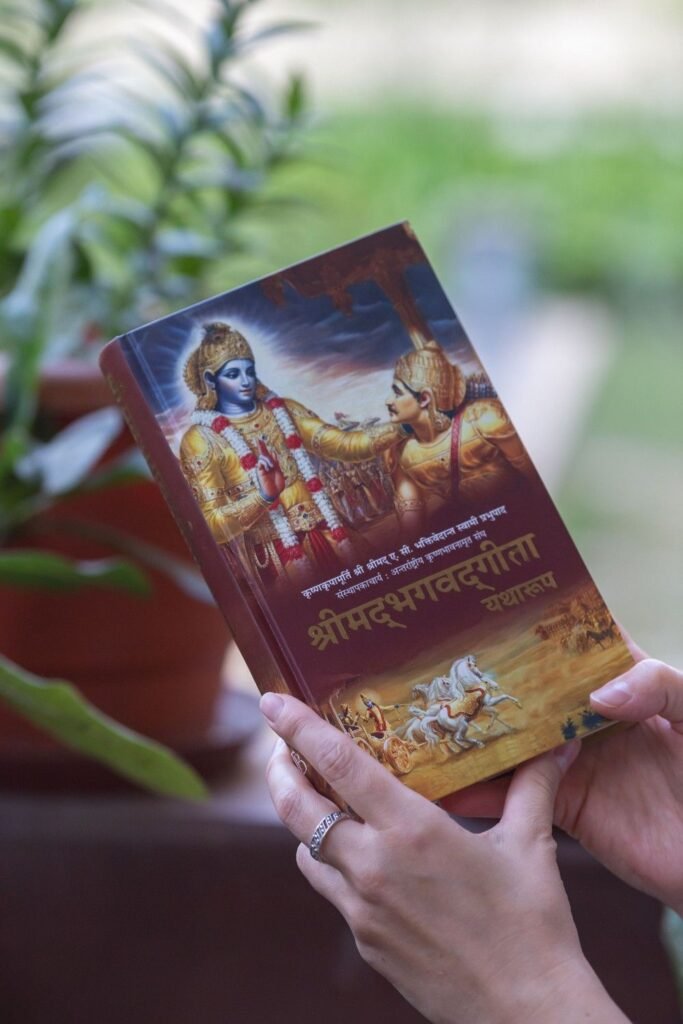
Bhagavad Gita 11.41
सखेति मत्वा प्रसभं यदुक्तं हे कृष्ण हे यादव हे सखेति। अजानता महिमानं तवेदं मया प्रमादात्प्रणयेन वापि।।11.41।।
sakheti matvā prasabhaṁ yad uktaṁ he kṛiṣhṇa he yādava he sakheti ajānatā mahimānaṁ tavedaṁ mayā pramādāt praṇayena vāpi
sakhā—friend; iti—as; matvā—thinking; prasabham—presumptuously; yat—whatever; uktam—addressed; he kṛiṣhṇa—O Shree Krishna; he yādava—O Shree Krishna, who was born in the Yadu clan; he sakhe—O my dear mate; iti—thus; ajānatā—in ignorance; mahimānam—majesty; tava—your; idam—this; mayā—by me; pramādāt—out of negligence; praṇayena—out of affection; vā api—or else;
Translation
Whatever I have presumptuously said from carelessness or love, addressing You as O Krishna! O Yadava! O Friend! regarding You merely as a friend, unknowing of Your greatness.
Commentary
11.41 सखा friend? इति as? मत्वा regarding? प्रसभम् presumptuously? यत् whatever? उक्तम् said? हे कृष्ण O Krishna? हे यादव O Yadava? हे सखा O friend? इति thus? अजानता unknowing? महिमानम् greatness? तव Thy? इदम् this? मया by me? प्रमादात् from carelessness? प्रणयेन due to love? वा or? अपि even.No Commentary.
Bhagavad Gita 11.42
यच्चावहासार्थमसत्कृतोऽसि विहारशय्यासनभोजनेषु। एकोऽथवाप्यच्युत तत्समक्षं तत्क्षामये त्वामहमप्रमेयम्।।11.42।।
yach chāvahāsārtham asat-kṛito ’si vihāra-śhayyāsana-bhojaneṣhu eko ’tha vāpy achyuta tat-samakṣhaṁ tat kṣhāmaye tvām aham aprameyam
yat—whatever; cha—also; avahāsa-artham—humorously; asat-kṛitaḥ—disrespectfully; asi—you were; vihāra—while at play; śhayyā—while resting; āsana—while sitting; bhojaneṣhu—while eating; ekaḥ—(when) alone; athavā—or; api—even; achyuta—Krishna, the infallible one; tat-samakṣham—before others; tat—all that; kṣhāmaye—beg for forgiveness; tvām—from you; aham—I; aprameyam—immeasurable
Translation
In whatever way I may have insulted You for the sake of fun, while at play, reposing, sitting, or at meals, when alone (with You), O Krishna, or in company, that I implore You, immeasurable one, to forgive.
Commentary
11.42 यत् whatever? च and? अवहासार्थम् for the sake of fun? असत्कृतः disrespected? असि (Thou) art? विहारशय्यासनभोजनेषु while at play? on bed? while sitting or at meals? एकः (when) one? अथवा or? अपि even? अच्युत O Krishna? तत् so? समक्षम् in company? तत् that? क्षामये implore to forgive? त्वाम् Thee? अहम् I? अप्रमेयम् immeasurable.Commentary Arjuna? beholding the Cosmic Form of Lord Krishna? seeks forgiveness for his past familiar conduct. He says? I have been stupid. I have treated Thee with familiarity? not knowing Thy greatness. I have taken Thee as my friend on account of misconception. I have behaved badly with Thee. Thou art the origin of this universe and yet I have joked with Thee. I have taken undue liberties with Thee. Kindly forgive me? O Lord.Tat All those offences.Achyuta He who is unchanging.In company In the presence of others.Aprameyam Immeasurable. He Who has unthinkable glory and splendour.
Bhagavad Gita 11.43
पितासि लोकस्य चराचरस्य त्वमस्य पूज्यश्च गुरुर्गरीयान्। न त्वत्समोऽस्त्यभ्यधिकः कुतोऽन्यो लोकत्रयेऽप्यप्रतिमप्रभाव।।11.43।।
pitāsi lokasya charācharasya tvam asya pūjyaśh cha gurur garīyān na tvat-samo ’sty abhyadhikaḥ kuto ’nyo loka-traye ’py apratima-prabhāva
pitā—the father; asi—you are; lokasya—of the entire universe; chara—moving; acharasya—nonmoving; tvam—you; asya—of this; pūjyaḥ—worshipable; cha—and; guruḥ—spiritual master; garīyān—glorious; na—not; tvat-samaḥ—equal to you; asti—is; abhyadhikaḥ—greater; kutaḥ—who is?; anyaḥ—other; loka-traye—in the three worlds; api—even; apratima-prabhāva—possessor of incomparable power
Translation
Thou art the Father of this world, both moving and unmoving. Thou art to be adored by this world; Thou, the greatest Guru; for none exists who is equal to Thee; how then could there be another superior to Thee in the three worlds, O Being of unrivaled power?
Commentary
11.43 पिता Father? असि (Thou) art? लोकस्य of the world? चराचरस्य of the moving and unmoving? त्वम् Thou? अस्य of this? पूज्यः to be reserved? च and? गुरुः the Guru? गरीयान् weightier? न not? त्वत्समः eal to Thee? अस्ति is? अभ्यधिकः surpassing? कुतः whence? अन्यः other? लोकत्रये in the three worlds? अपि also? अप्रतिमप्रभाव O Being of unealled power.Commentary There exists none who is eal to Thee There cannot be two or more Isvaras. If there were? the world will not get on as it does now. All the Isvaras may not be of one mind? as they would all be independent of one another. What one wishes to create? another may wish to destroyWhen there does not exist one who is eal to Thee? how could there be one superior to TheeFather Creator. As the Lord is the creator of this world He is fit to be adored. He is the greatest Guru also. Therefore there is no one who is eal to the Lord.
Bhagavad Gita 11.44
तस्मात्प्रणम्य प्रणिधाय कायं प्रसादये त्वामहमीशमीड्यम्। पितेव पुत्रस्य सखेव सख्युः प्रियः प्रियायार्हसि देव सोढुम्।।11.44।।
tasmāt praṇamya praṇidhāya kāyaṁ prasādaye tvām aham īśham īḍyam piteva putrasya sakheva sakhyuḥ priyaḥ priyāyārhasi deva soḍhum
tasmāt—therefore; praṇamya—bowing down; praṇidhāya—prostrating; kāyam—the body; prasādaye—to implore grace; tvām—your; aham—I; īśham—the Supreme Lord; īḍyam—adorable; pitā—father; iva—as; putrasya—with a son; sakhā—friend; iva—as; sakhyuḥ—with a friend; priyaḥ—a lover; priyāyāḥ—with the beloved; arhasi—you should; deva—Lord; soḍhum—forgive
Translation
Therefore, bowing down and prostrating my body, I crave Thy forgiveness, O adorable Lord. As a father forgives his son, a friend his dear friend, a lover his beloved, even so may Thou forgive me, O God.
Commentary
11.44 तस्मात् therefore? प्रणम्य saluting? प्रणिधाय having bent? कायम् body? प्रसादये crave forgiveness? त्वाम् Thee? अहम् I? ईशम् the Lord? ईड्यम् adorable? पिता father? प्रियः beloved? प्रियायाः to the beloved? अर्हसि (Thou) shouldst? देव O God? सोढुम् to bear.Commentary O Lord? take me to Thy bosom as a mother does her child. Forgive me for all tht I have hitherto spoken or done. Forgive my faults. Please overlook my past mistakes. I have done this through ignorance. Now I have come to Thee in submission. I beg Your pardon now.
Bhagavad Gita 11.45
अदृष्टपूर्वं हृषितोऽस्मि दृष्ट्वा भयेन च प्रव्यथितं मनो मे। तदेव मे दर्शय देव रूपं प्रसीद देवेश जगन्निवास।।11.45।।
adṛiṣhṭa-pūrvaṁ hṛiṣhito ’smi dṛiṣhṭvā bhayena cha pravyathitaṁ mano me tad eva me darśhaya deva rūpaṁ prasīda deveśha jagan-nivāsa
adṛiṣhṭa-pūrvam—that which has not been seen before; hṛiṣhitaḥ—great joy; asmi—I am; dṛiṣhṭvā—having seen; bhayena—with fear; cha—yet; pravyathitam—trembles; manaḥ—mind; me—my; tat—that; eva—certainly; me—to me; darśhaya—show; deva—Lord; rūpam—form; prasīda—please have mercy; deva-īśha—God of gods; jagat-nivāsa—abode of the universe
Translation
I am delighted, having seen something never seen before; yet my mind is distressed with fear. Show me that form only, O God; have mercy, O God of gods, O Abode of the universe.
Commentary
11.45 अदृष्टपूर्वम् what was never seen before? हृषितः delighted? अस्मि (I) am? दृष्ट्वा having seen? भयेन with fear? च and? प्रव्यथितम् is distressed? मनः mind? मे my? तत् that? एव only? मे to me? दर्शय show? देव O God? रूपम् form? प्रसीद have mercy? देवेश O Lord of the gods? जगन्निवास O Aboe of the universe.Commentary For an ordinary man the Cosmic Form (Vision) is overwhelming and terrifying but for a Yogi it is encouraging? strengthening and soulelevating.Arjuna says The Cosmic Form was never before seen by me. Show me only that form which Thou wearest as my friend.
Bhagavad Gita 11.46
किरीटिनं गदिनं चक्रहस्त मिच्छामि त्वां द्रष्टुमहं तथैव। तेनैव रूपेण चतुर्भुजेन सहस्रबाहो भव विश्वमूर्ते।।11.46।।
kirīṭinaṁ gadinaṁ chakra-hastam ichchhāmi tvāṁ draṣhṭum ahaṁ tathaiva tenaiva rūpeṇa chatur-bhujena sahasra-bāho bhava viśhva-mūrte
kirīṭinam—wearing the crown; gadinam—carrying the mace; chakra-hastam—disc in hand; ichchhāmi—I wish; tvām—you; draṣhṭum—to see; aham—I; tathā eva—similarly; tena eva—in that; rūpeṇa—form; chatuḥ-bhujena—four-armed; sahasra-bāho—thousand-armed one; bhava—be; viśhwa-mūrte—universal form
Translation
I desire to see You as before, crowned, bearing a mace, with the discus in hand, in Your former form only, having four arms, O thousand-armed, Cosmic Being.
Commentary
11.46 किरीटिनम् wearing crown? गदिनम् bearing a mace? चक्रहस्तम् with a discus in the hand? इच्छामि (I) desire? त्वाम् Thee? द्रष्टुम् to see? अहम् I? तथैव as before? तेनैव that same? रूपेण of form? चतुर्भुजेन (by) fourarmed? सहस्रबाहो O thousandarmed? भव be? विश्वमूर्ते O Universal Form.Commentary Arjuna says O Lord in the Cosmic Form I do not know where to turn and to whom to address myself. I am frightened. I am longing to see Thee with conch? discus? mace and lotus. Withdraw Thy Cosmic Form. Assume that same fourarmed form as before.Spiritual aspirants are ofen impatient to have the highest spiritual experiences immediately they begin their Sadhana. This is wrong. They will not be able to withstand the great power that will,surge into them. Be patientO thousandarmed refers to the Cosmic Form.
Bhagavad Gita 11.47
श्री भगवानुवाच मया प्रसन्नेन तवार्जुनेदं रूपं परं दर्शितमात्मयोगात्। तेजोमयं विश्वमनन्तमाद्यं यन्मे त्वदन्येन न दृष्टपूर्वम्।।11.47।।
śhrī-bhagavān uvācha mayā prasannena tavārjunedaṁ rūpaṁ paraṁ darśhitam ātma-yogāt tejo-mayaṁ viśhvam anantam ādyaṁ yan me tvad anyena na dṛiṣhṭa-pūrvam
śhrī-bhagavān uvācha—the Blessed Lord said; mayā—by me; prasannena—being pleased; tava—with you; arjuna—Arjun; idam—this; rūpam—form; param—divine; darśhitam—shown; ātma-yogāt—by my Yogmaya power; tejaḥ-mayam—resplendent; viśhwam—cosmic; anantam—unlimited; ādyam—primeval; yat—which; me—my; tvat anyena—other than you; na dṛiṣhṭa-pūrvam—no one has ever seen
Translation
The Blessed Lord said, “O Arjuna, this Cosmic Form has graciously been shown to you by Me through My own Yogic power. It is full of splendour, primeval, and infinite; this Cosmic Form of Mine has never been seen before by anyone other than you.”
Commentary
11.47 मया by Me? प्रसन्नेन gracious? तव to thee? अर्जुन O Arjuna? इदम् this? रूपम् form? परम् supreme? दर्शितम् has been shown? आत्मयोगात् by My own Yogic power? तेजोमयम् full of splendour? विश्वम् universal? अनन्तम् endless? आद्यम् primeval? यत् which? मे of Me? त्वत् from thee? अन्येन by another? न not? दृष्टपूर्वम् seen before.Commentary Lord Krishna eulogises the Cosmic Form because Arjuna should be regarded to have achieved all his ends by seeing this Cosmic Form.It is also an inducement to all spiritual aspirants to strive to attain this sublime vision. What they should do is explained by the Lord in verse 53 to 55.
Bhagavad Gita 11.48
न वेदयज्ञाध्ययनैर्न दानै र्न च क्रियाभिर्न तपोभिरुग्रैः। एवंरूपः शक्य अहं नृलोके द्रष्टुं त्वदन्येन कुरुप्रवीर।।11.48।।
na veda-yajñādhyayanair na dānair na cha kriyābhir na tapobhir ugraiḥ evaṁ-rūpaḥ śhakya ahaṁ nṛi-loke draṣhṭuṁ tvad anyena kuru-pravīra
na—not; veda-yajña—by performance of sacrifice; adhyayanaiḥ—by study of the Vedas; na—nor; dānaiḥ—by charity; na—nor; cha—and; kriyābhiḥ—by rituals; na—not; tapobhiḥ—by austerities; ugraiḥ—severe; evam-rūpaḥ—in this form; śhakyaḥ—possible; aham—I; nṛi-loke—in the world of the mortals; draṣhṭum—to be seen; tvat—than you; anyena—by another; kuru-pravīra—the best of the Kuru warriors
Translation
Neither by the study of the Vedas, nor by gifts, nor by sacrifices, nor by severe austerities, can I be seen in this form in the world of men by any other than yourself, O great hero of the Kurus (Arjuna).
Commentary
11.48 न not? वेदयज्ञाध्ययनैः by the study of the Vedas and of Yajnas? न not? दानैः by gifts? न not? च and? क्रियाभिः by rituals? न not? तपोभिः by austerities? उग्रैः severe? एवंरूपः in such form? शक्यः (am) possible? अहम् I? नृलोके in the world of men? द्रष्टुम् to be seen? त्वत् than thee? अन्येन by another? कुरुप्रवीर O great hero of the Kurus.Commentary Mere cramming of the texts of the Vedas without knowing the meaning will not do. A study of the sacrifices also is necessary. One should know the meaning of these? also.Dana Charity such as a Tula Purusha (gift of gold eal in weight of a man) Kanyadana (gift of ones daughther in marriage)? gift of a cow? rice? etc.Kriya Rituals such as Agnihotra.Tapas Such as the Chandrayana Vrata. (This is a kind of Vrata or observance. The daily consumption of food is reduced by one mouthful every day for the dark half of the month beginning with the fullmoon. Then the food is increased by one mouthful every day during the bright fortnight during the increase of the moon. This Vrata (observance) is a great purifier of the mind. It destroys sins.)
Bhagavad Gita 11.49
मा ते व्यथा मा च विमूढभावो दृष्ट्वा रूपं घोरमीदृङ्ममेदम्। व्यपेतभीः प्रीतमनाः पुनस्त्वं तदेव मे रूपमिदं प्रपश्य।।11.49।।
mā te vyathā mā cha vimūḍha-bhāvo dṛiṣhṭvā rūpaṁ ghoram īdṛiṅ mamedam vyapeta-bhīḥ prīta-manāḥ punas tvaṁ tad eva me rūpam idaṁ prapaśhya
mā te—you shout not be; vyathā—afraid; mā—not; cha—and; vimūḍha-bhāvaḥ—bewildered state; dṛiṣhṭvā—on seeing; rūpam—form; ghoram—terrible; īdṛik—such; mama—of mine; idam—this; vyapeta-bhīḥ—free from fear; prīta-manāḥ—cheerful mind; punaḥ—again; tvam—you; tat eva—that very; me—my; rūpam—form; idam—this; prapaśhya—behold
Translation
Do not be afraid, nor be bewildered on seeing such a terrible form of Mine; with your fear dispelled and with a gladdened heart, now behold again this former form of Mine.
Commentary
11.49 मा not? ते thee? व्यथा fear? मा not? च and? विमूढभावः bewildered state? दृष्ट्वा having seen? रूपम् form? घोरम् terrible? ईदृक् such? मम My? इदम् this? व्यपेतभीः with (thy) fear dispelled? प्रीतमनाः with gladdened heart? पुनः again? त्वम् thou? तत् that? एव even? मे My? रूपम् form? इदम् this? प्रपश्य behold.Commentary Former form is the form with four hands with conch? discus? club or mace and lotus.The Lord was Arjuna in a state of terror. Therefore? He withdrew the Cosmic Form and assumed His usual gentle form. He consoled Arjuna and spoke sweet? loving words.

Bhagavad Gita 11.50
सञ्जय उवाच इत्यर्जुनं वासुदेवस्तथोक्त्वा स्वकं रूपं दर्शयामास भूयः। आश्वासयामास च भीतमेनं भूत्वा पुनः सौम्यवपुर्महात्मा।।11.50।।
sañjaya uvācha ity arjunaṁ vāsudevas tathoktvā svakaṁ rūpaṁ darśhayām āsa bhūyaḥ āśhvāsayām āsa cha bhītam enaṁ bhūtvā punaḥ saumya-vapur mahātmā
sañjayaḥ uvācha—Sanjay said; iti—thus; arjunam—to Arjun; vāsudevaḥ—Krishna, the son of Vasudev; tathā—in that way; uktvā—having spoken; svakam—his personal; rūpam—form; darśhayām āsa—displayed; bhūyaḥ—again; āśhvāsayām āsa—consoled; cha—and; bhītam—frightened; enam—him; bhūtvā—becoming; punaḥ—again; saumya-vapuḥ—the gentle (two-armed) form; mahā-ātmā—the compassionate
Translation
Sanjaya said, Having thus spoken to Arjuna, Krishna again showed His own form. The great Soul, assuming His gentle form, then consoled Arjuna, who was terrified.
Commentary
11.50 इति thus? अर्जुनम् to Arjuna? वासुदेवः Vaasudeva? तथा so? उक्त्वा having spoken? स्वकम् His own? रूपम् form? दर्शयामास showed? भूयः again? आश्वासयामास consoled? च and? भीतम् who was terrified? एनम् him? भूत्वा having become? पुनः again? सौम्यवपुः of gentle form? महात्मा the greatsouled One.Commentary His own form His form as the son of Vasudeva.
Bhagavad Gita 11.51
अर्जुन उवाच दृष्ट्वेदं मानुषं रूपं तवसौम्यं जनार्दन। इदानीमस्मि संवृत्तः सचेताः प्रकृतिं गतः।।11.51।।
arjuna uvācha dṛiṣhṭvedaṁ mānuṣhaṁ rūpaṁ tava saumyaṁ janārdana idānīm asmi saṁvṛittaḥ sa-chetāḥ prakṛitiṁ gataḥ
arjunaḥ uvācha—Arjun said; dṛiṣhṭvā—seeing; idam—this; mānuṣham—human; rūpam—form; tava—your; saumyam—gentle; janārdana—he who looks after the public, Krishna; idānīm—now; asmi—I am; saṁvṛittaḥ—composed; sa-chetāḥ—in my mind; prakṛitim—to normality; gataḥ—have become
Translation
Arjuna said, “Having seen this Thy gentle human form, O Krishna, now I am composed and have been restored to my own nature.”
Commentary
11.51 दृष्ट्वा having seen? इदम् this? मानुषम् human? रूपम् form? तव Thy? सौम्यम् gentle? जनार्दन O Krishna? इदानीम् now? अस्मि (I) am? संवृत्तः composed? सचेताः with mind? प्रकृतिम् to nature? गतः restored.Commentary Arjuna says to Lord Krishna O Lord? I now behold Thy human form. Now my thoughts are collected and I am serene. I can speak. My senses perform their proper functions. My fear has vanished. Thou hast treated me as a mother would treat her erring child whom she embraces and nurses. Just as the calf rejoices when it beholds its mother who was missing for some days? so also I rejoice now when I behold Thy gentle form. I have drunk the nectar. Now I am alive.
Bhagavad Gita 11.52
श्री भगवानुवाच सुदुर्दर्शमिदं रूपं दृष्टवानसि यन्मम। देवा अप्यस्य रूपस्य नित्यं दर्शनकाङ्क्षिणः।।11.52।।
śhrī-bhagavān uvācha su-durdarśham idaṁ rūpaṁ dṛiṣhṭavān asi yan mama devā apy asya rūpasya nityaṁ darśhana-kāṅkṣhiṇaḥ
śhrī-bhagavān uvācha—the Supreme Lord said; su-durdarśham—exceedingly difficult to behold; idam—this; rūpam—form; dṛiṣhṭavān asi—that you are seeing; yat—which; mama—of mine; devāḥ—the celestial gods; api—even; asya—this; rūpasya—form; nityam—eternally; darśhana-kāṅkṣhiṇaḥ—aspiring to see;
Translation
The Blessed Lord said, “It is very hard indeed to see this form of Mine which thou hast seen; even the gods are ever longing to behold it.”
Commentary
11.52 सुदुर्दर्शम् very hard to see? इदम् this? रूपम् form? दृष्टवानसि thou hast seen? यत् which? मम My? देवाः gods? अपि also? अस्य (of) this? रूपस्य of form? नित्यम् ever? दर्शनकाङ्क्षिणः (are) desrious to behold.Commentary Lord Krishna says to Arjuna Though the gods long to behold the Cosmic Form yet they have not seen it as you have done. THey can never behold it.Just as the Chataka (a bird) longs for a drop of rain? eagerly turning its eyes towards the clouds? so also do gods yearn to behold the Cosmic Form but their wishes have not been gratified even in their dreams. Such is that marvellous vision which thou hast easily seen.
Bhagavad Gita 11.53
नाहं वेदैर्न तपसा न दानेन न चेज्यया। शक्य एवंविधो द्रष्टुं दृष्टवानसि मां यथा।।11.53।।
nāhaṁ vedair na tapasā na dānena na chejyayā śhakya evaṁ-vidho draṣhṭuṁ dṛiṣhṭavān asi māṁ yathā
na—never; aham—I; vedaiḥ—by study of the Vedas; na—never; tapasā—by serious penances; na—never; dānena—by charity; na—never; cha—also; ijyayā—by worship; śhakyaḥ—it is possible; evam-vidhaḥ—like this; draṣhṭum—to see; dṛiṣhṭavān—seeing; asi—you are; mām—me; yathā—as
Translation
Neither by the Vedas, nor by austerity, nor by gift, nor by sacrifice can I be seen in this form as thou hast seen Me so easily.
Commentary
11.53 न not? अहम् I? वेदैः by the Vedas? न not? तपसा by austerity? न not? दानेन by gift? न not? च and? इज्यया by sacrifice? शक्यः (am) possible? एवंविधः like this? द्रष्टुम् to be seen? दृष्टवानसि (thou) hast seen? माम् Me? यथा as.Commentary This Cosmic Form which thou hast seen so easily cannot be obtained either by the study of the Vedas and the six modes of philosophy? nor by the practice of manifold austerities (penances)? nor by charity? nor by sacrifices of various kinds.Arjuna was indeed very fortunate in seeing the Cosmic Form.How can the Lord be seen Listen The heart must be overflowing with true devotion to Him. (Cf.XI.48)
Bhagavad Gita 11.54
भक्त्या त्वनन्यया शक्यमहमेवंविधोऽर्जुन। ज्ञातुं दृष्टुं च तत्त्वेन प्रवेष्टुं च परंतप।।11.54।।
bhaktyā tv ananyayā śhakya aham evaṁ-vidho ’rjuna jñātuṁ draṣhṭuṁ cha tattvena praveṣhṭuṁ cha parantapa
bhaktyā—by devotion; tu—alone; ananyayā—unalloyed; śhakyaḥ—possible; aham—I; evam-vidhaḥ—like this; arjuna—Arjun; jñātum—to be known; draṣhṭum—to be seen; cha—and; tattvena—truly; praveṣhṭum—to enter into (union with me); cha—and; parantapa—scorcher of foes
Translation
But by single-minded devotion, I can be known, seen, and entered into in reality, O Arjuna.
Commentary
11.54 भक्त्या by devotion? तु indeed? अनन्यया singleminded? शक्यः (am) possible? अहम् I? एवंविधः of this form? अर्जुन O Arjuna? ज्ञातुम् to know? दृष्टुम् to see? च and? तत्त्वेन in reality? प्रवेष्टुम् to enter into? च and? परंतप O Parantapa (O scorcher of the foes).Commentary Devotion is the sole means to the realisation of the Cosmic Form.AnanyaBhakti Singleminded devotion. Onepointed unbroken devotion the devotion which does not seek any other object but the Lord alone. In this type of devotion no object other than the Lord is experienced by any of the senses. Egoism and dualism totally vanish.Of this form refers to the Cosmic Form.By singleminded devotion it is possible not only to know Me as declared in the scriptures but also to realise Me? i.e.? to attain liberation. The devotee realises that the Lord is all this and He alone is the ultimate Reality. When he gets this experience of illumination he gets merged in Him. (Cf.VIII.22X.10)
Bhagavad Gita 11.55
मत्कर्मकृन्मत्परमो मद्भक्तः सङ्गवर्जितः। निर्वैरः सर्वभूतेषु यः स मामेति पाण्डव।।11.55।।
mat-karma-kṛin mat-paramo mad-bhaktaḥ saṅga-varjitaḥ nirvairaḥ sarva-bhūteṣhu yaḥ sa mām eti pāṇḍava
mat-karma-kṛit—perform duties for my sake; mat-paramaḥ—considering me the Supreme; mat-bhaktaḥ—devoted to me; saṅga-varjitaḥ—free from attachment; nirvairaḥ—without malice; sarva-bhūteṣhu—toward all entities; yaḥ—who; saḥ—he; mām—to me; eti—comes; pāṇḍava—Arjun, the son of Pandu
Translation
He who does all actions for Me, who regards Me as the Supreme, who is devoted to Me, who is free from attachment, who bears no enmity towards any creature, he comes to Me, O Arjuna.
Commentary
11.55 मत्कर्मकृत् does actions for Me? मत्परमः looks on Me as the Supreme? मद्भक्तः is devoted to Me? सङ्गवर्जितः is freed from attachment? निर्वैरः without enmity? सर्वभूतेषु towards all creatures? यः who? सः he? माम् to Me? एति goes? पाण्डव O Arjuna.Commentary This is the essence of the whole teaching of the Gita. He who practises this teaching will attain Supreme Bliss and Immortality. This verse contains the summary of the entire philosophy of the Gita.He who performs actions (duties) for the sake of the Lord? who consecrates all his actions to Him? who serves the Lord with his heart and soul? who regards the Lord as his supreme goal? who lives for Him alone? who works for Him alone? who sees the Lord in everything? who sees the whole world as the Cosmic Form of the Lord and therefore cherishes no feeling of hatred or enmity towards any creature even when great injury has been done by others to him? who has no attachment or love to wealth? children? wife? friends and relatives? and who seeks nothing else but the Lord? realises Him and enters into His Being. He becomes one with Him.Thus in the Upanishads of the glorious Bhagavad Gita? the science of the Eternal? the scripture of Yoga? the dialogue between Sri Krishna and Arjuna? ends the eleventh discourse entitledThe Yoga of the Vision of the Cosmic Form.,


